#sukuna theory
Note
Gege is a troll, but I still can’t imagine that he’s serious about Sukuna’s lactation. Bro looks like a walking barrel of testosterone and muscle. How can he have lactation and hormone imbalance?🤯
I will still think that he had his own farm, because shortages of anything were not a problem for him. He's a king. The version with lactation is so illogical.
♠️
Agreed- I say he had a luxury cow farm. Like those massive Brahma Bulls/Caws beautiful. They get big, I went to a biggest Brahma show one time. The Females/cows were so big and they looked like they were built to mass produce milk.
I get these are bulls but he has one of these colors
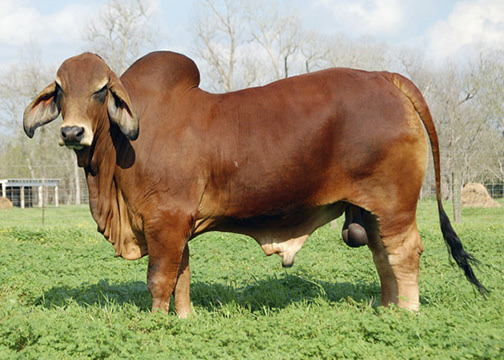
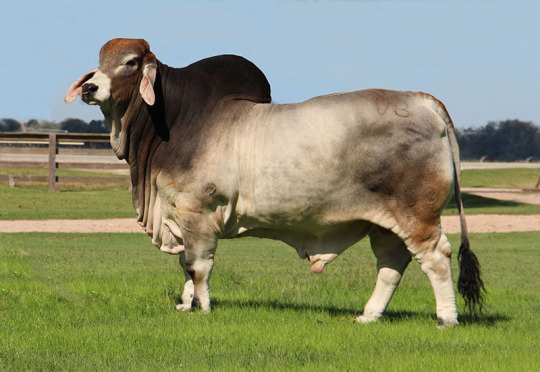
Now I see Cow Farmer Sukuna 😭
But- I saw a subreddit with some cursed theory- but I’m going to choose to believe he just loves Cow Milk, and maybe his wife’s milk-
But if it comes out he really lactates- I guess.. well ya know.. in some cases men lactate but it’s usually for other reasons and it doesn’t provide as much nutrition or calories as a mothers milk would so now that i think about it 🤔
He has to drink raw cow milk- pure form creamy/frothy cow smelling milk. Steaming Hot out cow into the cup and chug chug chug
I still stand by he drinks his wife’s milk 🥛
#sukunas wife#🤍mail time#♠️ anon#daddy sukuna#sukuna ryomen#jjk anime#jujutsu kaisen#ryomen sukuna#Sukuna theory
31 notes
·
View notes
Text
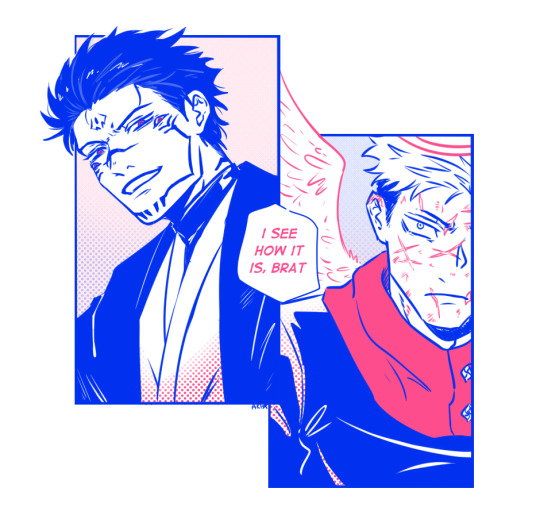
#akim0ri art#jujutsu kaisen#yuuji itadori#ryomen sukuna#i am reposting from my twitter don't mind me#this idea inspired from others theory of Angel taking Yuuji as their next vessel after Hana O)-)
5K notes
·
View notes
Text
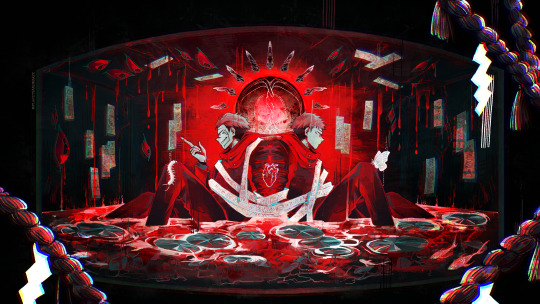
forced coexistence
#jjk#jujutsu kaisen#itadori yuuji#ryomen sukuna#my art#artists on tumblr#jjk 248#kinda? i drew this before the chapter came out lmao#this was inspired by twin theory and the kodoku ritual but well it fits the chapter so eh#something something conjoined souls stuck in a box
779 notes
·
View notes
Note
"He took the malevolent shrine in the divorce" is the fucking funniest concept I've heard today
Let Yuji have the house or the fucking shadow dogs, 2k23. 😭🙏🏼 Honestly, it’s the least that Sukuna could do to pay for all the damages.
#sukuita#a fraught marriage that’s falling apart and into a messy divorce#let higuruma sucker punch sukuna with alimony charges he won’t see it coming#malevolent shrine for itadori yuji ftw#i went to such a rabbit hole w the crack divorce theory i watched a clip#from a marriage story ya know the one w adam driver and scarlet jo#and i cried#in barely repressed hysterical laughter#as the image of sukuna and yuji superimposed the actors on the screen#thats a good edit idea ngl 🤣😂😂#jjk#jujutsu kaisen#sukuna#ryomen sukuna#itadori yuuji#higuruma hiromi
572 notes
·
View notes
Text
Ok so about my questions about Jin Itadori…
[SPOILERS AHEAD]
Most of them remain unanswered but I went back to some old manga scans and I realized that I went through them WAY too quickly omg
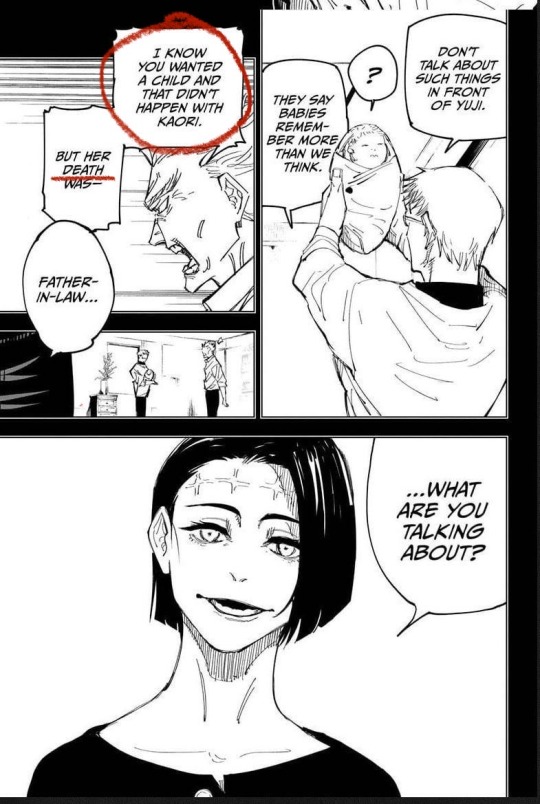
Like this man KNEW laaaawd he knew that was not his wife. You’re gonna tell me this sweet looking man basically messed with his partner’s dead-🤚🏾🤚🏾🤚🏾 alright. I can’t do this rn. Now we just need to find out if the binding vow theory is true or not.
What do you guys think? 😭😭
Edit: Also I bet what gramps was about to say is that her death was NOT accidental
#jjk#jujutsu kaisen#jjk manga#jujutsu kaisen fandom#jjk spoilers#jujutsu sorcerer#kaori itadori#itadori jin#itadori yuuji#jjk itadori#jjk yuji#jujutsu kaisen headcanons#jjk theory#manga spoilers#sukuna#kenjaku#jjk 257
189 notes
·
View notes
Text
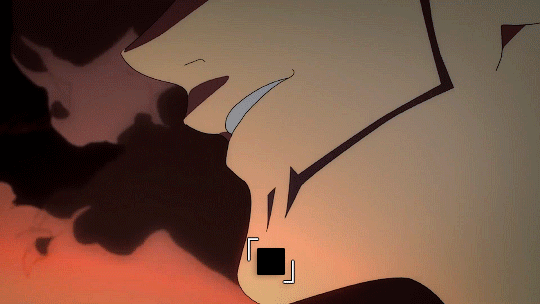
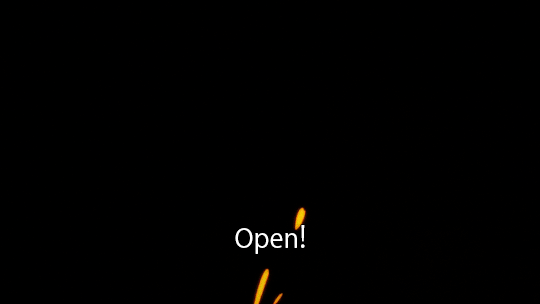

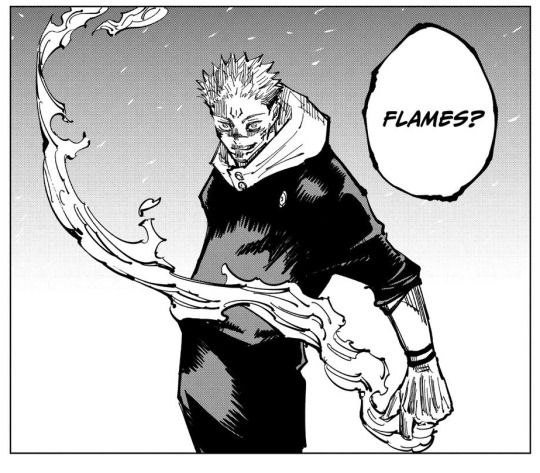
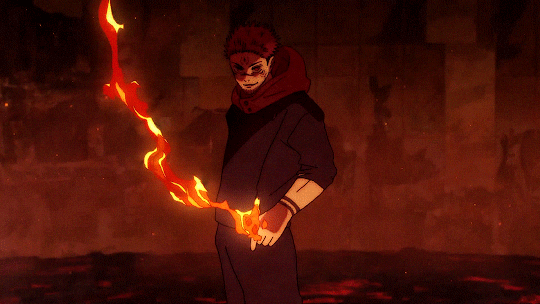
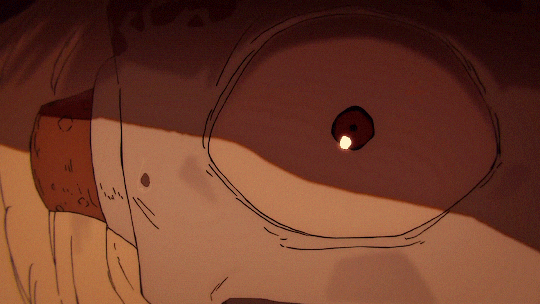
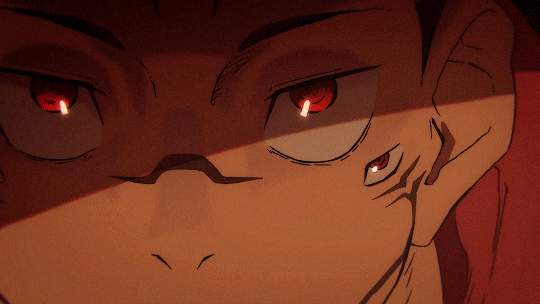



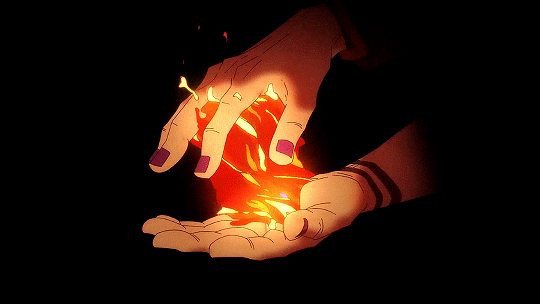
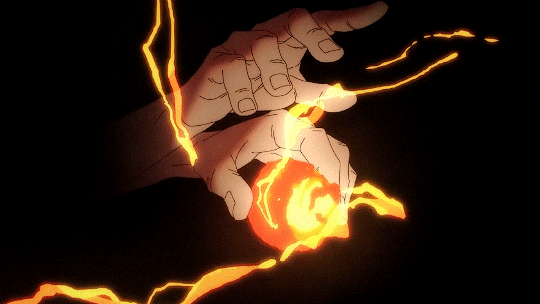
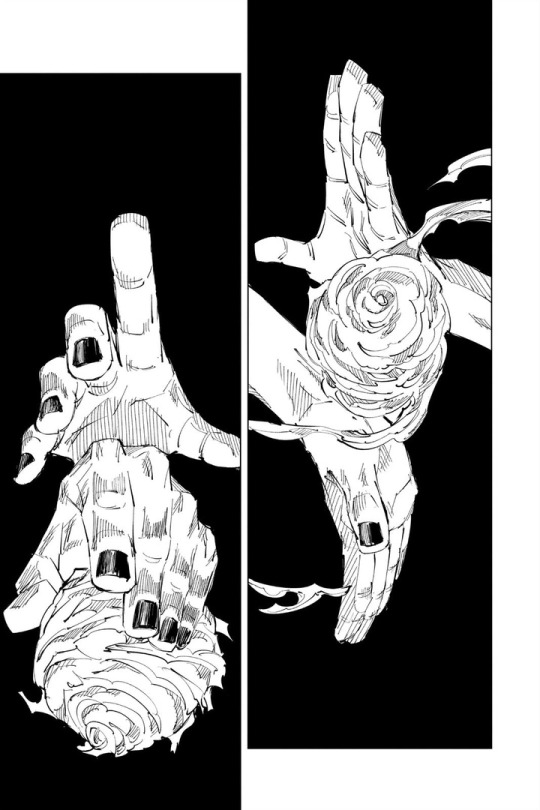
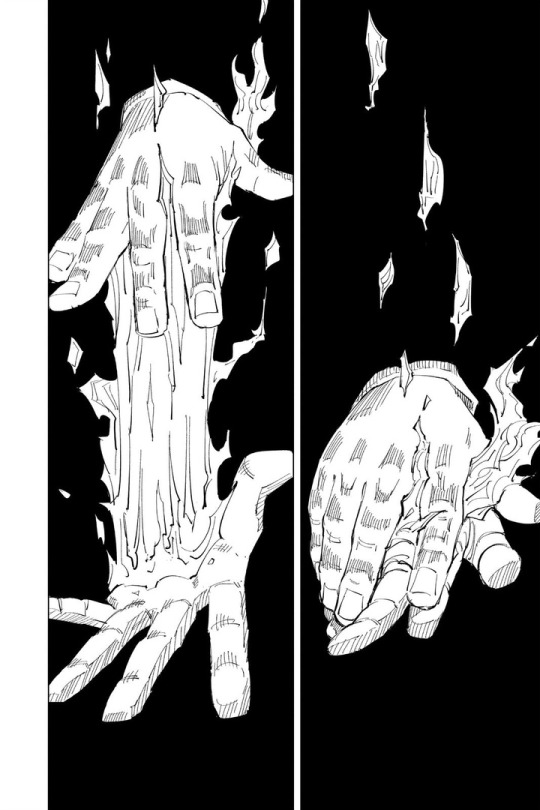
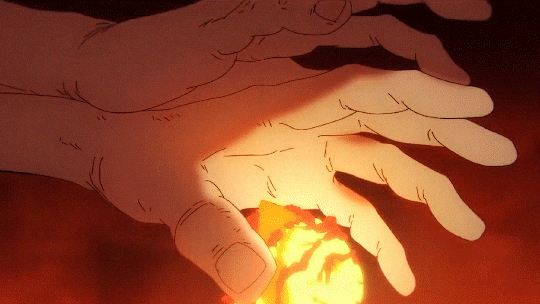
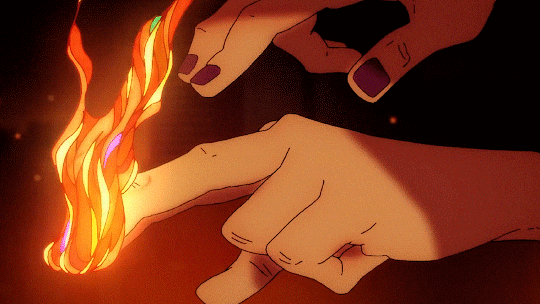
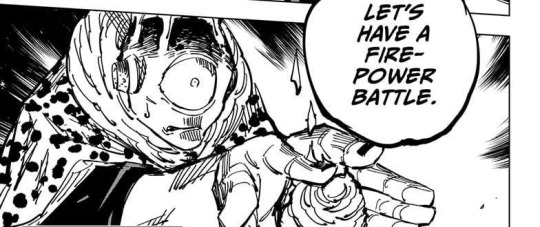

Jujutsu Kaisen | Jogo v. Sukuna
S02E16 V. CHAPTER 115 & 116
Though you have managed to pique my interest. So I'll fight you with your own specialty
#ryomen sukuna#sukuna#jjk spoilers#jjk#jujutsu kaisen#呪術廻戦#宿儺#宿儺 v 漏瑚#漏瑚#jogo#jogo jjk#shibuya arc#ohhhhh#i'm so excited and the phrasing used by Sukuna really pushes my theory on his technique#my japanese sucks#but the closest to what Sukuna says is:#開 (フーガ)#open (fugue)#this is insanely long ooopsssss#but this has always been one of my favourite scenes so giffing it and then putting the pics together??#AHHHHH i'm in heaven#mappa#jjk mappa#thank you mappa#jjk gifs#jujutsu kaisen anime spoilers#jujutsu kaisen spoilers
510 notes
·
View notes
Text
Why i believe Gojo could come back
This chapter left us in a devastated state and was absolutely uncalled for, but I personally believe this isnt the end of the strongest sorcerer. There are several reasons as to why (These are just opinions, I could be wrong in certain areas AND personal feelings might make an occassional appearance.)
LEAKS:

This whole panel was obviously made for a reason. And we dont see gojo making a decision. Considering the fact that this is literally THE Gojo Satoru, he's more likely to choose north since there's numerous things left as plot holes. We'll get to that.
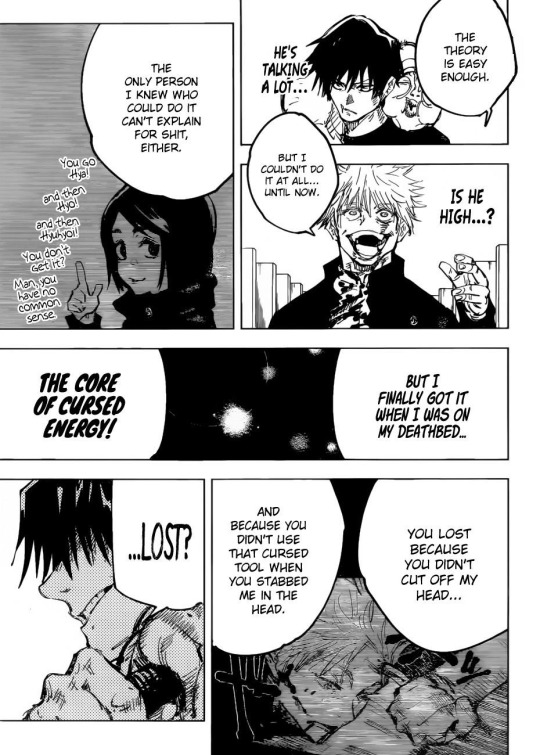
Here in this page, he mentions that Toji should've cut his head off to actually kill him. In the leaks, whats cut off is his upper body but not the head! I still can't quite wrap my head around RCT but lets say he's not able to heal himself. You know who can and who would? Yuta and Shoko


Now moving on

"Gojo then bids farewell to everyone." If hes truly gone then why would he be bidding farewell to the fallen comrades? If he's dead then isn't he supposed to stay in the afterlife with them?

Pretty self explanatory
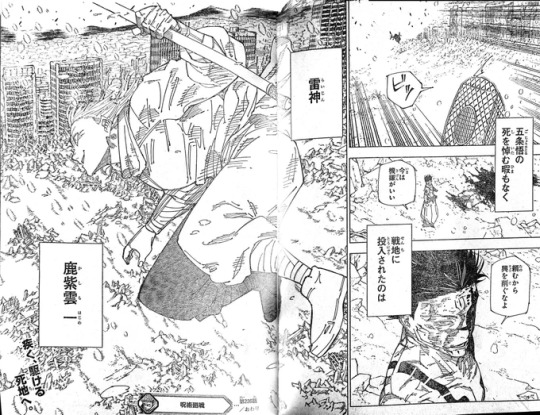
What if Kashimo is going in to distract Sukuna while Shoko and Yuta can heal Gojo?
Now think about this. Gojo is gone, Shoko doesnt fight and who are all left? A bunch of sorcerers who are literally under 20, need guidance and we havent really seen any panel where they actually plan how they're going to go about in the whole battle. Gojo isnt a want, hes a NEED, a NECESSITY.
Remember, Toji who was dead long ago pretty much appeared out of nowhere in Shibuya Arc LMAO so- yes

WHAT IS THIS EVEN SUPPOSED TO MEAN
Theres no way Gojo would be left sealed for 3 whole years, brought him back just to kill him off in the most disrespectful way possible.
Besides, things that Gojo wanted to do haven't happened yet.
He wanted to tell megumi about his father
He wanted to see his students surpass the strongest sorcerer, aka him
He wanted to get rid of the higher ups
He wanted to properly mourn suguru (for which kenjaku has to be defeated but oh well)
He wanted to save Megumi
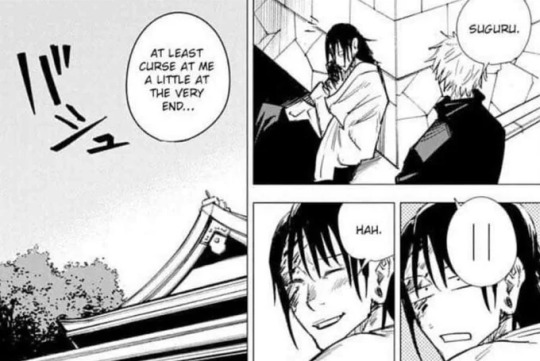
How'd we know what Gojo said here.
On to the other aspects of why killing off Gojo was a bad idea. We barely ever saw what happened to him, and an off screen death to the so called strongest sorcerer is just senseless. Gojo is a fan favourite. People started watching the show for Gojo (myself included) and there's a high possibility of multiple people dropping the manga since he isn't even there anymore.
The ending could take a turn for the worse considering the fact that Sukuna is just overpowered and Kenjaku hasn't done anything as of now. Unless there's some heavy plot armor I dont think the students even stand a chance against Sukuna and Kenjaku. Both outcomes- the students and others emerging as victors or sukuna emerging as a victor could make the ending absolutely terrible and this might as well top AOT for being the manga with the most disliked ending.
Gojo Satoru is the mentor for multiple; for Yuji, Nobara, Megumi, Yuta, Maki, Panda, Toge and the third years and its necessary for them to have someone to teach them. It is one of Satoru's wishes to see his students surpass him, which can happen only when he's there since there's nobody else who is actually capable of teaching them and leading them into the world as actual graduated sorcerers.
So Gojo dying will make the manga take a turn for the worse. Killing him off in the middle makes absolutely no sense and is just plain bad writing. People are prolly gonna kill me for this but lets admit the truth. Hyping this battle, building up tension just to finish him off screen is NOT good writing.
Anyways. There is factual proof of Gojo potentially making a return. Maybe at a cost, like him losing his power, losing his "strongest" title or anything else. He may not even be the same anymore but honestly as long as he's back, I'm fine.

It happened previously, and could happen again.
Satoru Gojo may not be the strongest and the honoured one, but may be reborn as a newer version of himself after getting humbled. Lotuses, as mentioned above symbolise rebirth, which is why i believe this is not the end.
A small bit of advice for gojo fans: Go watch haikyuu or highschool babysitters as a form of self care <3
#jjk#jujutsu kaisen#jjk236#gojo#gojo satoru#jjk gojo#jjk theory#jjk spoiler#jujutsu kaisen spoilers#sukuna#jjk sukuna#yuji itadori#satoru gojo#jjk leaks#jujutsu kaisen leaks#dont worry yall hes not dead#gojo will win#jjk manga#jjk headcanons#gojo x reader#jjk megumi#megumi fushiguro#toji fushiguro#jjk toji#jjk gojo satoru#jujutsu gojo#geto suguru#kenjaku#yuta okkotsu#shoko ieiri
1K notes
·
View notes
Text
I've read a few good translations on Sukuna's revelations from last chapter and it's basically confirmed now that Kenjaku infused Yuji with one of Sukuna's fingers when he was born/created. This implies that when this happened:
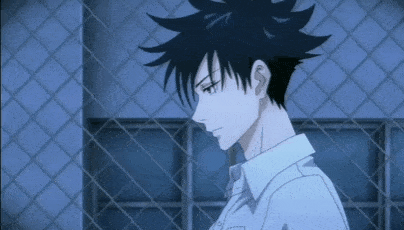
Megumi didn't feel the missing finger he was after but an unknown finger that Yuji had always carried inside him.
It had been said by Megumi that he felt the residuals from the box the finger was in. In retrospect, the image and intensity of Sukuna's presence fits Yuji's special constitution more than just the residuals from a box.
192 notes
·
View notes
Text
a lot of people are saying that narratively it would be anticlimactic if it isn’t gojo who defeats kenjaku, bc kenny is in geto’s body. but gojo’s sealing scene airing in the anime this week reminded me of something - as far we know, kenny STILL doesn’t know much about yuta as a sorcerer. he hasn’t learned more during the culling games (as far as i remember?), so he doesn’t know (bc geto didn’t know) that yuta is a special grade on his own, and cursed rika, not the other way around.
which means when gojo before being sealed says that yuta will beat kenny, while kenny laughs it off in shibuya, i think in the end gojo will be right. obviously the final fight has to be yuji vs sukuna. and specifically yuji and megumi’s soul vs sukuna, to parallel and tie up megumi vs sukuna and yuji’s soul. but just like this story has multiple protagonists, it also has multiple villains - the person who it makes the most sense to be the final face off for kenjaku is YUTA.
1) yuta has defeated geto’s cursed techniques before.
2) narratively it would be full circle if gojo’s student and teachings defeats the ancient curse user who stole gojo’s beloved’s body. especially if gojo died before he could properly mourn geto’s body like he said he wanted. there’s also a theory that with gojo dead, yuta could copy the six eyes + limitless, but even without that, it would work.
3) the main theme of jjk is BREAKING LITERAL GENERATIONAL CURSES. if the only special grade sorcerer left alive (Yuta), trained by Gojo who mentored a new gen to operate differently and care about each other and change jujutsu society, defeats one of the most powerful curse user’s of ancient times (Kenjaku), it will be a symbolic defeat of the cycle, and of the new finally exorcising the bad of the old.
#original post#jujutsu kaisen#jjk spoilers#jjk 236#jjk theory#satoru gojo#satosugu#yuta okkotsu#kenjaku#shibuya arc#sukuna
618 notes
·
View notes
Text
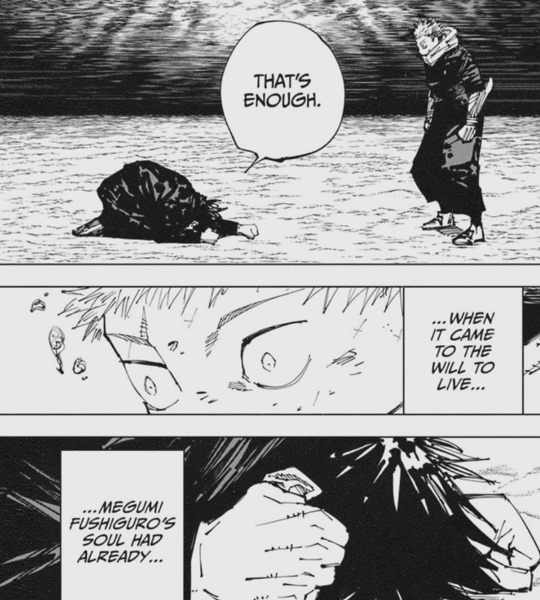
Megumi Will Start the Merger Theory
You heard me. I know this sounds wild and out of left field, but it's just a theory. A Jujutsu Kaisen theory. I fully acknowledge it might not happen, but please stick around long enough for me to argue why I think Megumi's character may go in this direction.
This one is for all the Megumi corruption arc truthers out there. I came up with this theory when it became clear that saving Megumi from Sukuna's grasp was going to be more difficult than just giving him a motivational speech, or punching Sukuna until their souls separated. Furthermore, I believe that Jujutsu Kaisen's manga won't end with the defeat of Sukuna. There will be one more curve ball thrown at us by Gege in the late game, and this is me trying to anticipate the pitch before the baseball hits me in the face. Underneath the cut I will speculate on the direction that Gege may take Megumi's arc, the relationship between Sukuna and Megumi, and Yuji's role in the finale.
What is a Corruption Arc?
Before digging in too deep I want to explain what I mean when I say I'm a Megumi corruption arc truther. A character arc is a story arc in regards to a character where a character changes from beginning to end. That's the most basic definition, arcs can be more complex, some arcs are actually inversions of the standard character arc where a character is defined by his lack of change.
However, those still need some element change, sometimes characters around them change to show contrast. For example, Eren is a stagnant character from beginning to end in Attack on Titan, but characters like Mikasa, Armin, Jean all grow up to show by comparison how little Eren has grown. Sometimes circumstances change around a character, and their lack of growth is a failure to adapt to those circumstances.
A character arc requires a change, but it's not necessarily a positive change. Often called negative character development, these characters regress instead of grow. This happens in many ways. One of the most basic examples of a character arc is a want / need arc. A want / need arc shows an emotional hole in the protagonist's life that needs repairing and how resolving the plot allows them to fill that hole. The protagonist usually knows what they need, but they know what they want, and often what they want won't actually fix them.
For example if I'm feeling sad I want to eat donuts to lift my mood, but what I need to do is learn healthier ways to work through my negative emotions. A character who keeps pursuing what they want, instead of realizing what they need won't grow, that's negative character development.
That's just one example though, Gege gave us a blueprint for a corruption arc in Hidden Inventory.
In Yu Yu Hakusho the character Sensui (directly cited by Gege as his inspiration for Geto in an interview) once was a spirit detective like the protagonist. No one describes him as corrupt from the beginning, in fact he's constantly described as more pure and upstanding than delinquent Yusuke Urameshi who likes getting into fights. He has a strong sense of justice, but rigid black and white views that come with it. Once he's confronted with evidence that directly contradicts his demons bad, humans good paradigm he cannot cope, and the narrative all but states Sensui's purity traditionally a good trait corrupted him because of his inability to adapt and his rigidity in in his beliefs.
Sensui goes through a corruption arc, albeit one offscreen and mainly referred to in backstory.
Geto's happens onscreen in its own story arc where he is one of two main characters. Much like Sensui he's presented to us as a sorcerer like Gojo, but unlike Gojo he believes sorcerers are obligated by duty to protect non-sorcerers who have no way of fighting against curses. You could argue that in some ways Geto and Gojo are the same type of jerk, but Geto's principles are clearly set up to contrast Gojo who at that age only was a sorcerer to flex his abilities. Geto's friendship often has him lecturing Gojo about respecting others, paying special attention to Gojo's feelings in ways that other characters don't, and also not being afraid to clash with Gojo over differences in morals.
If Geto is corrupt from the beginning there's no arc there, so he's clearly set up as being the moral fiber to contrast Gojo. We are literally presented with a scene where Gojo admits he could kill the non-sorcerers who hired a bounty hunter to assasinate Riko and feel nothing, and relies on Geto to make a moral judgement in his place, that society will already punish them and their slaughter is pointless.
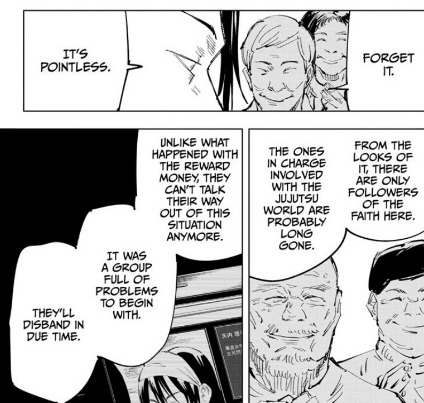
The irony is that later, Geto will engage in pointless slaughter killing an entire town in retribution for their abuse of Nanako and Mimiko. When Gojo confronts him about his actions, Gojo cites the same reasoning that Geto provided him to stop him from killing the cult members.
That Geto's murder of innocent civilians is pointless, because it won't achieve anything - his world of sorcerers is out of reach. Geto's clearly positioned as Gojo's moral tether, because he cites Geto's statement of only killing when there's meaning to it right back at him.
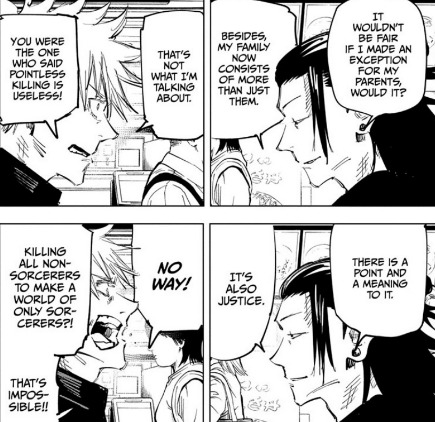
This is also where the corruption part of his corruption arc comes in, a change has taken place here. Geto hypocritically contradicts his earlier words, not just engaging in meaningless slaughter but also punishing people with his own hands instead of letting the justice systems in place take care of the punishments. Two things he held Gojo back from doing, only to do himself post corruption arc.
You could cite many things as the reason for Geto's corruption arc, but the common theme shared with Sensui is resistance to change. Geto saw the world in two distinct categories strong / weak, the same way Sensui saw humans good / demons bad. When Geto is shown that weak people are capable of bonding together to oppress strong people (the cult) and that sorcerers despite having strength are on the losing end of their society (they are expected to risk their lives and toil endlessly for curses 99% of the population can't even see), he cannot cope.
He especially cannot cope with the reality that Rika's death showed him, that he is not strong as he once believed. All of this combined leads Geto to double down, still seeing strong and weak as separate categories but now blaming normal citizens for the inherent corruption inside the Jujutsu World. Notice how Gojo a character with positive development seeks to reform from inside the Jujutsu World instead.
Geto also still wants to think of himself in the strong category, rather than facing the feelings that Riko's death and his helplessness in that moment gave him, as well as Gojo pulling he instead decides to double down on the idea that he's in the strong category, that he's superior.
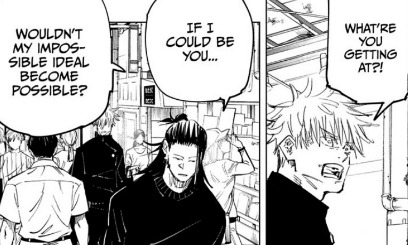
Geto even remarks jealousy at Gojo's godlike power for the first time, when before this he's always been the only person to treat Gojo as an equal - because Geto doubling down on his superiority complex begins imagining himself above others and therefore untouchable by trauma. It's also a grab for agency, because in this world sorcerers are rather agenciless, forced to be cogs in an unfair system. Geto incorrectly assumes agency = power. If he possessed Gojo's power he would be able to grab his agency back (which is simply incorrect because Gojo is one of the most agenciless characters in the manga, defined by his rigid role as the lynchpin of society).
Geto also doesn't mature. A mature adult lives in the world, and accepts that the world is imperfect. Geto is remarked as childish, first by Shoko when they are smoking together "sulking because no one understands you... sounds awfully childish if you ask me", and then by Yuta "You think you're a god? You sound like a kid!"
So we have, refusal to grow up, refusal to adapt to a complex world, resistance to grief, and grabbing for agency and power instead of fixing an issue inside himself - all of these combine to make the Jenga Tower that is Geto Suguru collapse.
The central question of Geto's arc, spoken by Gojo to Yaga is "Is it possible to save someone who doesn't want to be saved?"
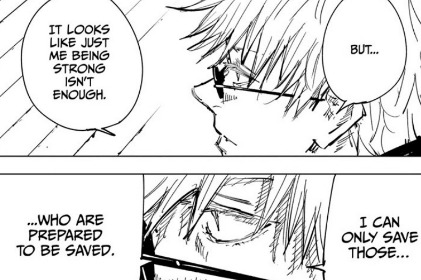
If Geto refuses all help, refuses to admit that he's wrong, and does not want to change then what really can Gojo do in this situation? Was he right to give up? Did he give up too early, refusing to kill Geto but also spending ten years just ignoring the problem until Geto attacked in Jujutsu Kaisen Zero? Did it not matter what Gojo did because ultimately Geto's choices are his own?
There's no clear answer, because it's a question the author is asking the audience to ponder. It's also a question directly set up for Megumi to answer, because when Gojo is unable to do a thing for Geto we see his next action is to seek out Megumi. His words imply that he sees Megumi in Geto and advises him not to be left behind, he also clearly became a teacher in order to not let what happened between him and Geto repeat in the next generation.
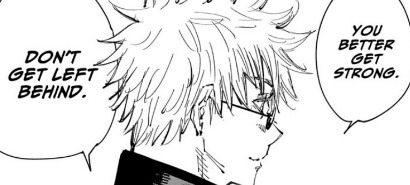
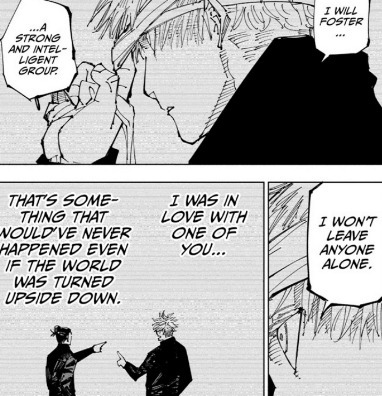
In spit of Gojo's best intentions, he's not able to protect Megumi from any of Sukuna's designs toward him, or basically anything that happens in post Shibuya's. Simply raising Megumi to be strong, did not prevent him from suffering trauma in his youth on Geto's level.
There's even a deliberate parallel, they both witness the death of an innocent who they promised to protect (Tsumiki, Riko Amanai) and they both have had their body taken from them, Geto's corpse is turned into a literal puppet to help advance Kenjaku's plans, Sukuna steals Megumi's body in order to revive himself in the modern era. They're both even used as tools against Gojo, Kenjaku uses Geto's body to awaken memories in Gojo and complete the sealing. Sukuna uses Mahoraga to learn the world splitting slash that cuts through Gojo's defenses.
Megumi also has a set of values that society spits in the face of. Megumi wishes to selfishly protect his sister, and pick and choose who to save. Geto believes the strong are obligated to protect the weak. Geto sees weak people who are corrupt and not worthy of his protection and also the reality that sorcerers are the exploited class, Megumi is forced to kill Tsumiki with his own hands.
These are intentional narrative parallels to show the risk of Megumi may walk the same path as Geto, especially since Megumi is in many ways a pure child like Geto himself.
Dark Phoenix Arc
There's one more corruption arc I want to compare Megumi's too, to give some idea of where I expect Megumi's arc to lead.
The Dark Phoenix Saga commonly refers to the story in Uncanny X-Men #129 - 138 of Jean Grey’s corruption by the power of the Phoenix and the Hellfire Club. It was considered incredibly shocking for its time. One thing to note is while Jean Grey is famous nowadays, in early X-Men she was the weakest character and her role was basically limited to “The Woman” of the team.
Elevating the helpless damsel woman to the most powerful member of the team, if not the entire universe and then having her turn evil had never been done before. It was a jaw-dropping shock at the time.
The reason I am citing the Dark Phoenix arc as an example, is because both Jean Grey and Megumi's character arc revolves around themes of agency, how it's stolen from them and how they reclaim it.
The basic summary of the Phoenix arc is that Jean Grey is initially given a massive power boost when she's possessed by the Phoenix. She stays behind on a crashing ship only to be saved by the Phoenix, a guardian, alien entity of immense power that was locked away in a crystal. Jean Grey returns as Phoenix with a massive power boost, but there's several ambiguous elements that compromise her agency. It's implied that Jean Grey always had a tremendous power that was in part sealed away by Professor Xavier using his telepathy (infringing on her agency) and that while the Phoenix gifted Jean Grey power, it's also an alien entity effecting her mind and body.
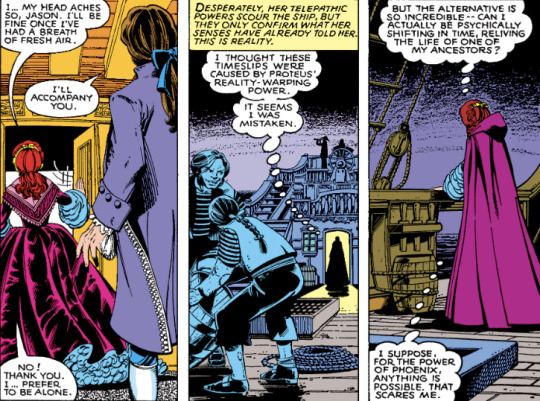
On top of that when she acquires the power, outside forces begin wanting to manipulate Jean in order to gain her power for their own ends.
A group called the Hellfire club begin to psychically tamper with her mind. They trap her in hallucination world where she is a woman of the 1800s, (not famously known for their agency) and in love with the leader of the Hellfire Club, even going so far as to give her false memories in order to convince her that this is reality.
The concept of agency and how it's constantly infringed upon, even by someone who's supposed to be on her side (Xavier) is central to this arc. Jean evetually escapes from the Hellfire club's manipulation, and reclaims her bodily autonomy but the story does not end there.
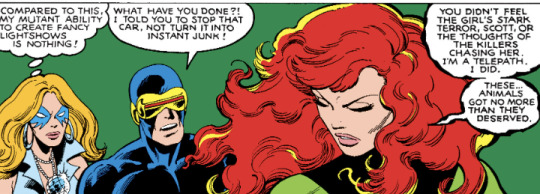
The subtle changes in Jean's behavior still continue, even after Jean has freed herself from the mind control. Is this the result of being given too much power at once? Is Jean losing control because she was never taught to properly handle her powers?
Jean Grey is also the character with the strongest potential in the main cast (much like Megumi) and also a character who's been prevented from using her powers to their full potential and even had her powers stolen and used by others (Much like Megumi).
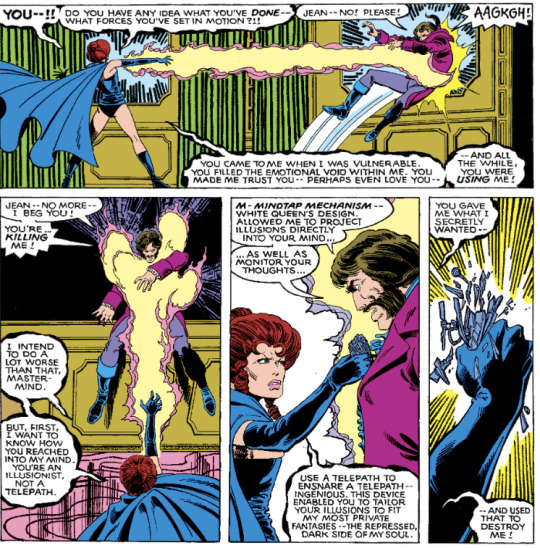
It's heavily important that Jean's corruption into dark phoenix happens after freeing herself, and in response to the Hellfire club's machination to take all agency away from her. Jean instead makes a grab for power and agency by abusing her power as Dark Phoenix.
Jean even mentions that turning against her friends and trying to kill them as Dark Phoenix, will sever the last tie holding her back, will get of Jean Grey for good and cause her to fully embrace being Phoenix.
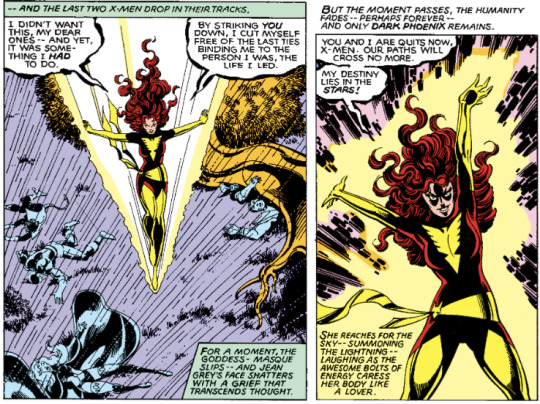
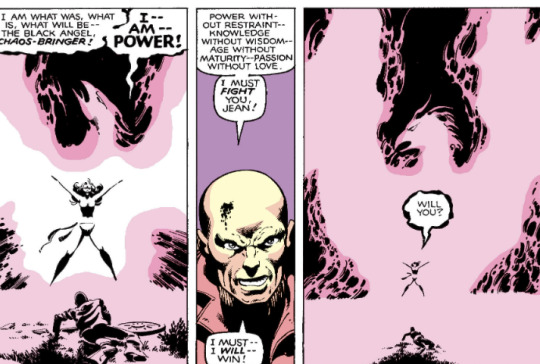
Jean has flipped entirely, overembracing the power and agency that has been stolen from her again and again, but really how could someone not desperately try to take back control of their lives after being mind controlled or having their mind violated multiple times (the phoenix itself, the hellfire club, even by Xavier).
How can someone never allowed to use her power, or given choices on how to use her power, not be corrupted when after being stepped on all of their lives the power of a god is dropped into their lap?
This is why I believe Megumi will be the one to initiate the merger, because his entire arc has been about having his power stolen away from him and what would Megumi do when given total power over the merger by Kenjaku?
Megumi Corruption Theory
The biggest piece of evidence for this theory is right here, Kenjaku specifically says to give Megumi Fushiguro the authority to start the merger.
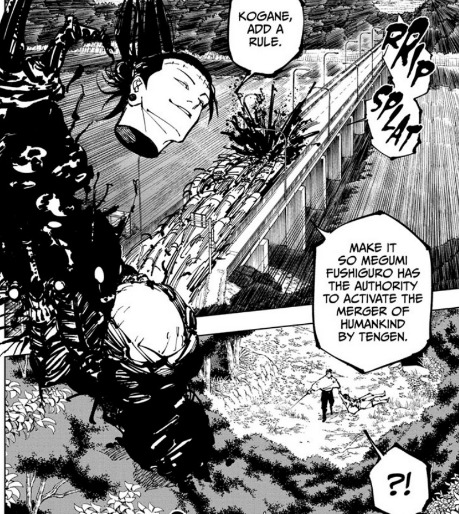
There's a technical reason for this, Sukuna is currently in Megumi's body, and Sukuna himself was actually registered in Yuji's place because Yuji was built by Kenjaku to be a cage for Sukuna.
However, it can also be read as foreshadowing. If you believe like I do that the merger has to happen, then Sukuna can't be the one to initiate it. The simple reason why is that the main characters will have to be alive to fight against a merger, and Sukuna has set the condition that he'll start the merger after killing the main cast in order to motivate them to fight him with everything they have.
If Sukuna is going to start the merger after killing all the main characters, then he can't be the one to start the merger because the main characters have to be alive to witness the merger take place and fight against it somehow.
Therefore, logically if the merger is going to occur the only person who could possibly activate it is Megumi Fushiguro after reclaiming his body.
There's more foreshadowing then this one instance however, and a lot of it revolves around Sukuna and Megumi's unique relationship and Sukuna's role as a character.
As for why Megumi would possibly start out the merger, it's the same as Jean Grey, a character denied of agency suddenly has all the power in his hands, who wouldn't be corrupted? Especially Megumi, a character who's just been robbed of his sister and his mentor, and his purpose in life besides that (protecting Tsumiki)? Why wouldn't he lash out if suddenly given the power to? His friends are trying to save him yes, but Megumi is begging those save friends not to save him to end it all.
How do you save someone who isn't prepared to be saved?
How is the story going to answer that question, if saving Megumi is a matter as simple as just beating up Sukuna and giving his body back to him?
Onto analyzing more foreshadowing, but first a brief tangent on the nature of foreshadowing in Jujutsu Kaisen. Every major twist in the manga is foreshadowed far in advance. Kenjaku beng the one to possess Geto's body - foreshadowed by Kenjaku killing Mechamaru when Geto was against killing young sorcerers, and the fact Geto was deliberately killed onscreen with no explanation provided to the audience on how he could possibly revive.
Sukuna calls the purpose of the bath to be near evil, to submerge Megumi's soul.
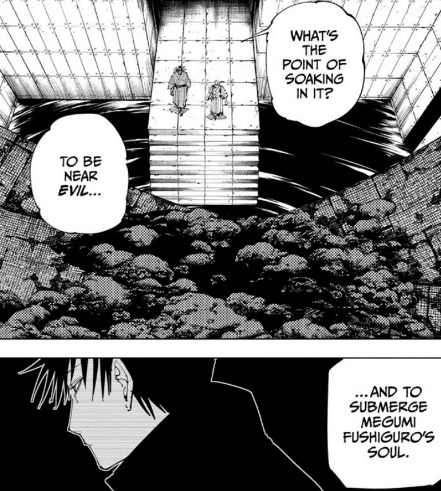
If saving Megumi is just a matter of ridding him of Sukuna's possession however, then how does that allow Megumi to reclaim his agency? What agency does a damsel in distress who just exists to be rescued have?
Megumi's entire arc has been defined by the potential power that everyone sees in him, and his inability to reach that power especailly since other characters (especially Sukuna) seek to steal that power for their own ends. In the culmination of this arc, Sukuna literally steals Megumi's body, and his bodily agency.
How does Megumi finally live up to that potential if Megumi's arc ends with him being saved by Yuji? How does this make Megumi grow or change in any way?
Sensui, who is once again Gege's model of a corruption arc is referred to as a pure angel that was inevitably grew scarred and defiled, by his close personal confidant Itsuki. Not only that, but sinking deep into despair made him grow stronger not weaker.
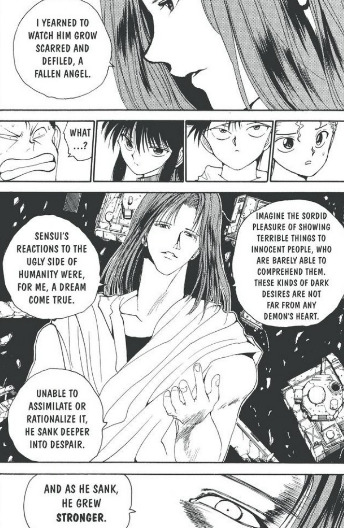
Itsuki is also, a demon who met and encountered Sensui and then took a deeply invested perosnal interest in watching Sensui be corrupted in real time.
Megumi also has a curse that took a sole interest in him because of his talent and potential, then had a hand in bringing him closer to evil in order to make him sink into despair. There's once again the symbolism of purity being corrupted.
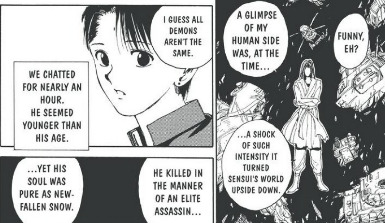
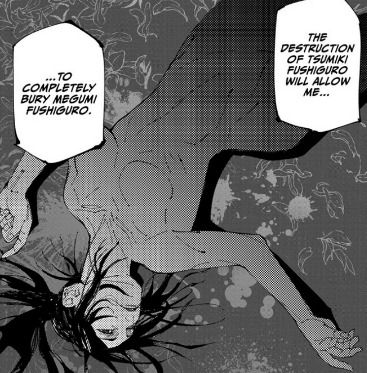
This panel explicitly shows white lilies (symbols of purity) being torn apart and blackened to symbolize what Sukuna wishes to do to Megumi in order to further is own ends.
There's also the heavy budhist symbolism with Sukuna's role in the story, and the way he influences the rest of the cast, especially Gojo Satoru who is our stand-in for the Budha. If the goal of Jujutsu Society is to attain enlightenment (escape cursed energy probably the only thing that will end the miserable lives of sorcerers), then the merger represents the opposite, Kenjaku's goal of optimizing cursed energy by mixing humans, sorcerers and curses to give birth to a new being.
That's also a conflict that needs to be resolved, but Sukuna by pushing forward the optimizing of cursed energy and representing the peak of sorcery living only for sorcerery and his own strength represents a Mara.
Sukuna is comparable to the Celestial Demon Mara in budhist mythology, more on it in this thread. In budhist cosmology, Mara is the “personification of the forces antagonistic to enlightenment.”
If the ultimate goal of budhism is to escape the cycle entirely and stop being reborn in the sensuous realm, Maara instead tempts people to stay in this realm. it defines impernanence by suggesting we stay in this realm forever. It defies Dukha by saying we indulge in physical pleasures in this realm, that we should seek to satisfy ourselves even if budhism argues that life is primarily unsatisfactory.
We even see Sukuna literally tempt a budha-like figure into remaining in this earthly realm. After all aren’t we shown that Gojo achieved enlightenment at seventeen and let go of earthly emotions like the need to be angry and avenge Riko’s killer because the feeling of oneness with existence was too good in that moment.
A lot of people noticed what they thought was Gojo acting out of character in the fight with him and Sukuna, by enjoying the fight and choosing his selfish desire to love jujutsu and fight as a sorcerer over his responsibiltiy to protect children. Something which Nanami says in his dying hallucination that Gojo only ever lived for the pursuit of his selfish desire for Jujutsu in the first place.
Gojo in his last fight against Sukuna forgets about saving Megumi or at least makes it a lesser priority, because Sukuna tempts him to do what he's always wanted to go all out in a sorcery fight and have the freedom to use his powers to the best of his ability. Hoewever, even after using his full strength, Sukuna cuts down the notion that he is above humanity and drags him back to the earth - literally calling him unenlightened.
“This is goodbye. You were born in an era without me and hailed as the strongest yet you turned out to be painfully ordinary…”
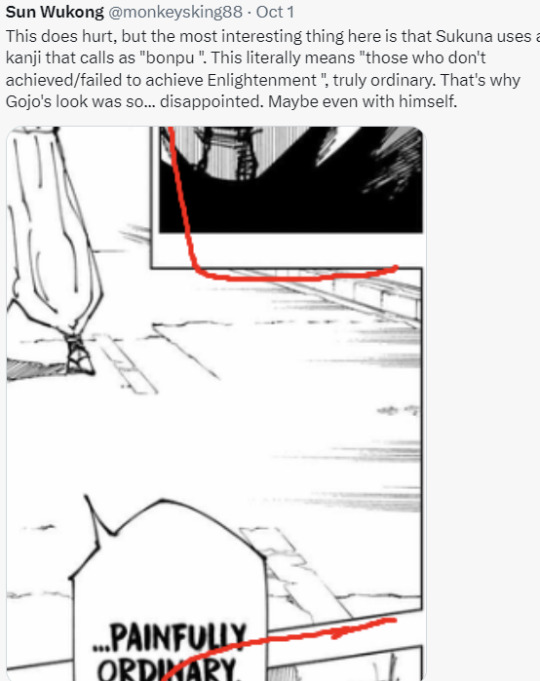
Does Sukuna not represent this temptation for all characters? Sukuna represents the selfish ideal of sorcerers, using his powers for himself to satisfy his hedonistic desires and because of this he has the most agency in the story and the story at times even bends to his desires.
Characters even fight for Sukuna's recognition, Hajime, Jogo and Gojo are validated by that same recognition in theend.
Why wouldn't Gojo and more importantly Megumi who are characters with very little agency not jump at the chance to be more like Sukuna, especially if it brings Sukuna the freedom he possesses?
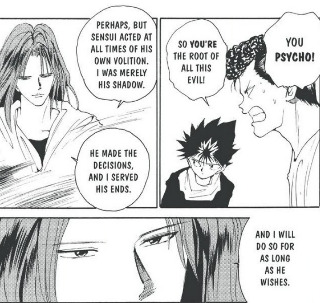
Itsuki refers to himself as Senseui's shadows, leading him to act on his darkest impulses and enjoying watching the corruption spread. Megumi is literally a character who's Jujutsu revolves around his shadow, and summoning powerful Shikigami from it in order to fight. A character with an incomplete domain expansion (another loose plot thread with Megumi that would be unresolved if Megumi were simply saved) which is his own creation, which might surpass Mahoraga the technique handed to him.
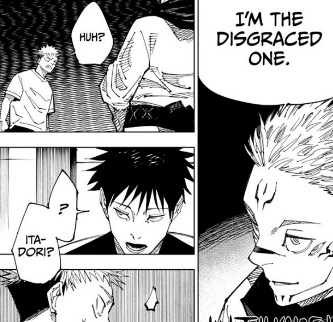
In addition to being a Mara, Sukuna is also literally called the "fallen / disgraced one". Itsuki calls Sensui a fallen agel, but in the context of Jujutsu Kaisen there's literally a character called Angel, who's only goal is to save Megumi's soul, and there is a satan figure in Sukuna who wants to corrupt him. Literally, there's an angel and devil on Megumi's shoulder.
How is stealing Megumi's body corruption though? Megumi's not being tempted into being selfish. He's not responsible for any of the sins that Sukuna commits in his body. There's no arc there, because Megumi doesn't reclaim his agency in response to having it stolen away, he doesn't decide to do the bad things himself - it's Sukuna who commits the wrongs.
Even More Setup for the End Game
Here's where I stop referencing Yu Yu Hakusho and only use foreshadowing in the comic itself. The first is the discussion of roles, and how Yuji needs to break away from them, as much as Megumi needs to fight for his agency back.
Part of the reason Sukuna jumped bodies is because Yuji wanted to be given an easy role like a character in a story - rather than thinking and deciding for himself. He thanks Megumi and Gojo for giving him a role seconds before the body swap happens. If Yuji is immediately punished for thinking that what he needs is to be a cog in the machine, to be given a role then methinks that's a bad thing.
However, Yuji has not broken away from that thinking in any significant way. Sukuna even mocks him for finally being given a role.
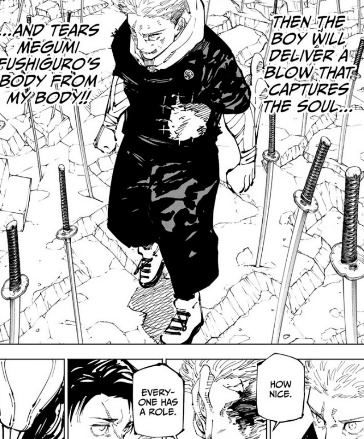
If Yuji's thinking hasn't changed then no story arc has taken place. If this conflict of Yuji wanting to conform to a cog or a role has persisted since Shibuya - then it's clearly important to his arc and is something that needs to be resolved. If Yuji just solves the problem by being stronger than Sukuna and beating him in a fight, how does that resolve Yuji's flaw of clinging to roles rather than thinking for himself? I ask once again, where's the change?
Saving Megumi like a damsel in distress is still a role someone else has assigned him.
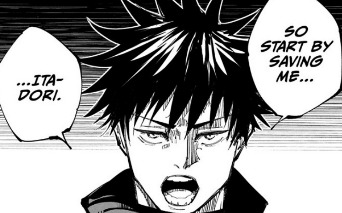
How does the decision to save Megumi right now challenge Yuji's hero complex in any way, besides the fact that Megumi has sunk into despair and would rather just end it all. Is that much a conflict that really forces Yuji to think for himself - to go against the grain of society rather than blindly following others.
If Yuji gets to rescue Megumi like a damsel, that's giving him what he wants, without forcing him to realize what he needs. That's as much of an unfullfilling end to Yuji's arc as a ending where Megumi never reclaims his agency and stands on his own feet and just has to sit there and wait and be passively saved.
Most of all the question: "Is it possible to save someone who's not prepared to be saved?" goes unanswered.
Geto wasn't just depressed and suicidal, he was actively making harmful choices and represented a danger to others. He also had no intention of stopping the path that he was on.
There's a clear parallel between Megumi and Yuji's friendship, and Geto and Gojo's past fallout. However, if it's just a conflict of Yuji saving Megumi who's simply too suicidal and doesn't want to go on living, there's no conflict there. The audience will not see whether or not Gojo was still capable of saving Geto post his burning down the village, or if there was no walking back from that choice. The previous generation won't resolve or fix the mistakes of the past generation.
Yuji remains a hero, Megumi remains a victim, as I reiterate for the thousandth time there's no change.
Megumi starting the merger, or even defeating Sukuna himself (maybe with a completed domain expansion) and then starting the merger is a change. It's also foreshadowed, Mahoraga is the technique he inherited, the technique Sukuna stole (and Mahoraga won't work against him he's already defeated it), Megumi's domain expansion is his own creation, created in his deepest moment of personal growth.
The process of individuation also literally requires a character fully integrating their shadow. Sukuna possessing Megumi is not Megumi facing his shadow or his worst traits, because Sukuna is not Megumi's shadow, he doesn't reflect Megumi's flaws in anyway, he's literally just a parasite.
There's also the 1001 Toji parallels to Megumi that have gone unfulfilled. Toji specifically a character who was abused, then chose to continue the cycle of abuse, specifically because he wanted to prove himself stronger than the peak of sorcery. Especially after a lifetime of being belittled and abused by not having the potential of his Heavenly Restriction recognized.
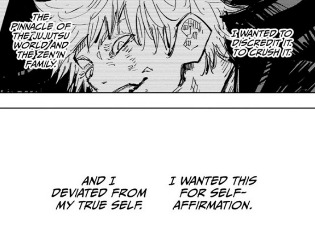
And what do we have here, but a scene of Toji LITERALLY EMERGING FROM MEGUMI'S SHADOW, in order to enter Dagon's domain.
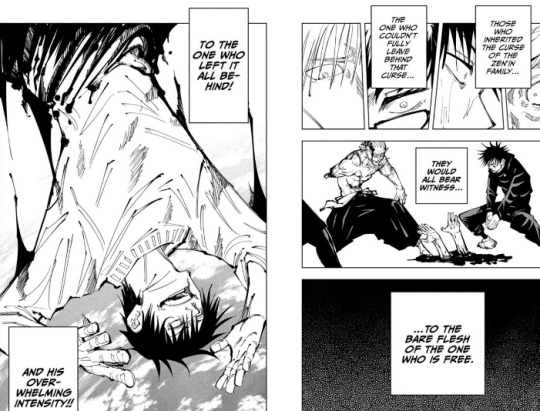
How is Toji referred to afterwards? As a puppet of carnage bearing his fangs at the strongest around.
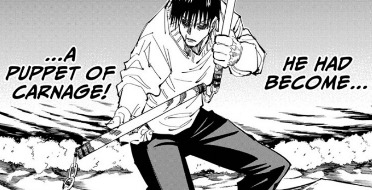
An incredibly Sukuna like description, number one because Sukuna's entire existence is simply bearing his fangs at the strongest around, and number two Sukuna is referred to as pure destruction, like a calamity, something with overhwelming sense of self and no humanity.
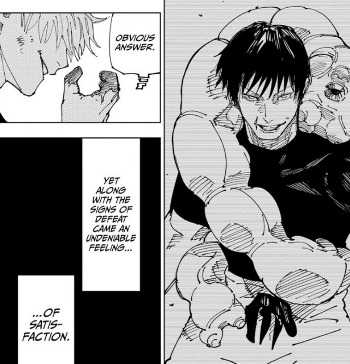
Not only that, but when fighting Sukuna, Gojo makes an explicit reference to Toji comparing him to Sukuna as the last time he ever felt nervous or challenged by an enemy. Sukuna and Toji are being alligned as similiar characters, supremely selfish people who hoard their agency and strength. Toji also represents the worst of Megumi, a victim caught in a perpetual cycle of lashing out against the world, a bad future path he might take if he doesn't get over himself.
Sukuna is connected to Toji wo is connected to Gojo, and all three represent a path that Megumi has been nudged down his entire life, that he should just selfishly use his power with no regards to anyone else the same way they do.
As I said before in my comparison to Jean, why wouldn't someone who's been robbed of all agency for so long, not go too far in reclaiming it? What's stopping them now that the chains are finally off?
Megumi parallels Geto, who parallels Toji, who parallels Sukuna and why draw all these lines between these characters if it's not to represent a path that Megumi could take?
In other words...
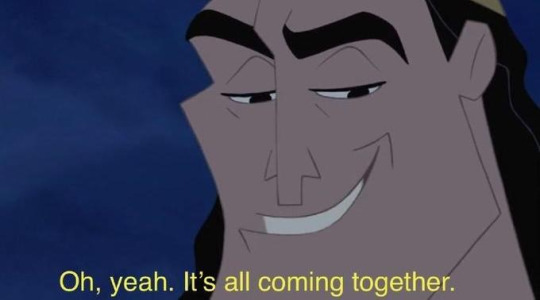
#megumi fushiguro#jjk meta#jujutsu kaisen#ryomen sukuna#geto suguru#fushiguro megumi#gojo satoru#jujutsu kaisen meta#jujutsu kaisen theory#jujutsu kaisen spoilers
185 notes
·
View notes
Text
‼️JJK SPOILERS‼️
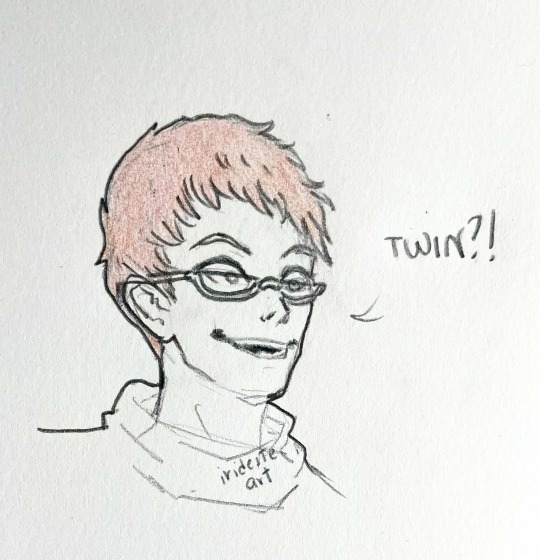

Here is the TikTok
With the music is even funnier 😂✈️
#digital fanart#digital drawing#fanart#jjk fanart#jjk art#jjk spoilers#jjk#jjk sukuna#ryomen sukuna#jujutsu sukuna#sukuna jjk#sukuna ryomen#jujutsu kaisen sukuna#ryoumen sukuna#sukuita#sukuna#sukuna art#jujutsu ryomen#jjk ryomen#jujutsu kaisen ryomen#ryomen#jjk leaks#jjk theory#jjk manga#itadori fanart#jujutsu kaisen itadori#yuuji itadori#yuji itadori#uncle sukuna#jjk 257
198 notes
·
View notes
Text
Bodies and Souls- part 2/2
(Part1)
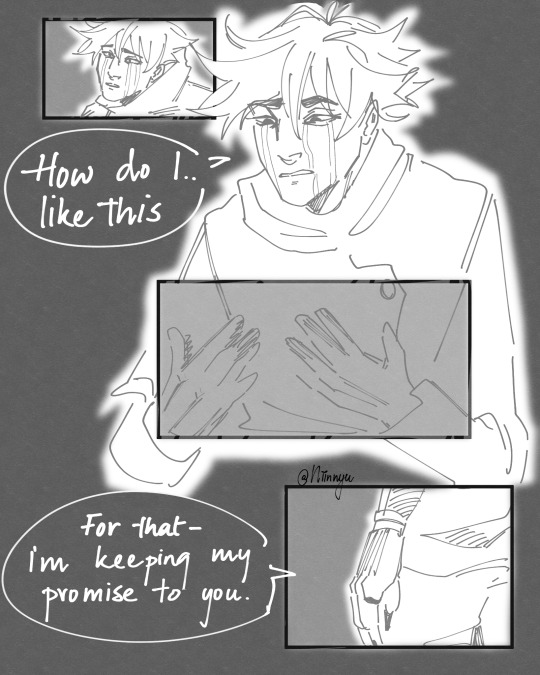



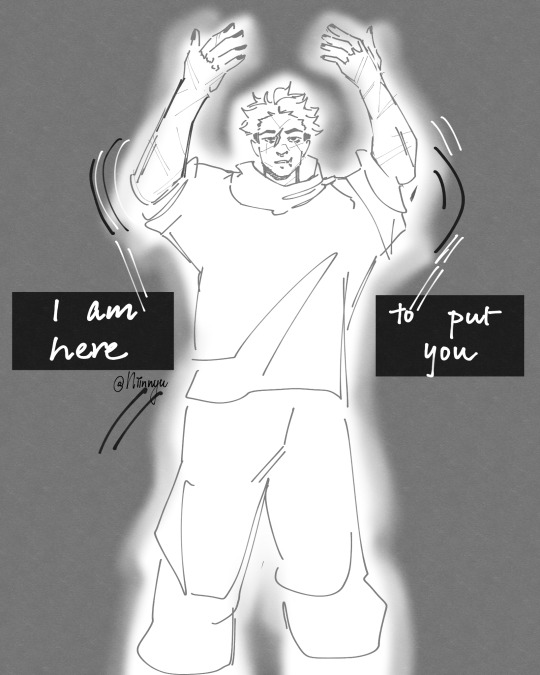

A little explaination below
This is based of the theory that Yuuji's cursed technique is the ability to swap souls (therefore swapping bodies, hinted in chapter 222(?) when Yuuji and Kusakabe seemed to have done so while training).
Yuuji uses this to swap souls with Megumi to get him out of there, and takes control of Sukuna's body because his soul is stronger than Sukuna's body (shown in the story previously with Suguru taking over Kenjaku momentarily, and Toji taking over that Grandson dude's body when brought back, both in S2).
Just incase it didn't make sense the person in page 3 is Megumi in Yuuji's body after the swap and the second last one is yuuji's soul.
Oof I've had this theory literally since jjk222 but wasn't sure how it'd play out but now it clicked so I'm glad I was able to make this heh
#also the recent official art ofsukuna and yuuji proves this for me ill maybe make a seperate post about that#ik this is a visually boring comic but i tried ok#i pulled a muscle in my arm and sprained my neck so it was a pain (literally)#also didnt meant to post this on yuuji's birthday my bad#trueform sukuna do be a weird guy to draw#fun tho#itadori yuuji#fushiguro megumi#itafushi#meguyuji#sukuna#true form sukuna#jujutsu kaisen#jjk spoilers#jjk fanart#jujutsu kaisen spoilers#jujutsu kaisen fanart#jjk art#sjjk 252#jjk 222#jjk manga spoilers#jjk theory#jjk#itadori yuji#sukuna ryoumen#niinnyu comics#niinnyu arts
227 notes
·
View notes
Text
You were defeated by your own self , self-loathing,selfeating, Sukuna .- twisted power of love
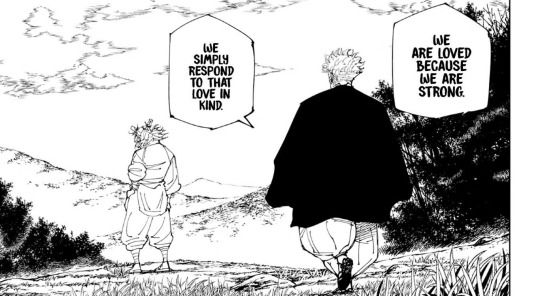
The projection of Gege's self-hatred onto his favorite character.
---The hardest battle you'll ever fight, is against yourself---
TL;DR
And thus, Yuji will strive to separate (Cut like Sukuna) his opponents BUT from their "evil" and direct his energy only towards this "evil," which is the opposite of a Sukuna's self-hatred power ,Yuji can be viewed as a mirror reflecting Sukuna's twisted power of love.
Therefore, the first chapter essentially, by title, reflects Yuuji and Sukuna
Sukuna's statement that "only the strong are loved" ("strong" can be of different kinds)takes on a particular significance: he attracts love through his strength , highlighting his main conflict reflected in his relationship with Yuji. For Yuji, strength and violence are alien; his essence is permeated with kindness. As a result, Sukuna feels his vulnerability, realizing that his achievements hold no value in Yuji's eyes. Experiencing self-hatred, he understands that while Yuji is simply kind to people, his love can be obtained "just like that," whereas towards Sukuna, Yuji harbors disdain, which is painful, as Sukuna has become strong out of a desire to receive love.
"Thus, he became strong because he realized that they loved strength, while he himself was weak. From this, he concluded that by being strong, he would receive love and respect simply for his existence as strong, and he would no longer feel weak. Therefore, his desire for love lost its significance, as only the weak needed it. Now his primary strength became his "love". And this means that using this strength towards himself and others can be compared to its application on the battlefield, where it is used to defeat the enemy. Thus, those who seek love from him will be destroyed, because all he has and who he is, is strength. Without it, he is nothing. "This implies that he cannot be loved because only the strong are loved". Thus, this expresses contempt for weakness, as the weak rely on "love" and connections, while he, being strong, does not need these connections, leading to rejection of both self-love and everything associated with it, and therefore, it is an expression of hatred.
The application of force (hatred) even towards oneself, towards one's weakness - the human side.
Thus, the application of force towards oneself and one's weakness in this context becomes a manifestation of contempt for the human side and dependence on love. This path can be interpreted as an extreme way to achieve self-assurance, which, nevertheless, cuts off from love and leads to hatred towards both oneself and the surrounding world.
The application of force towards oneself and one's weakness here is presented as a way of rejecting love and refusing to accept the human side - thus self-denial-self-eating.
This contradiction is manifested in the irony of the situation: a person becomes strong in his desire to rid himself of his weakness and dependence on love, but as a result, he becomes consumed by hatred, both towards himself and towards the surrounding world.
This desire is expressed through the denial of the human side, the refusal to accept one's weaknesses and dependence on love. This leads to strength becoming the main attribute of personality, while human connections and emotions, such as love, are rejected as unnecessary and even harmful.
Thus, the application of force towards oneself and one's weakness, as well as the denial of love and dependence on it, create a cycle of self-destruction and hatred towards oneself and the surrounding world. This can be interpreted as a path that, although aimed at achieving self-assurance, ultimately leads to isolation and spiritual destruction.
The cycle of samsara.
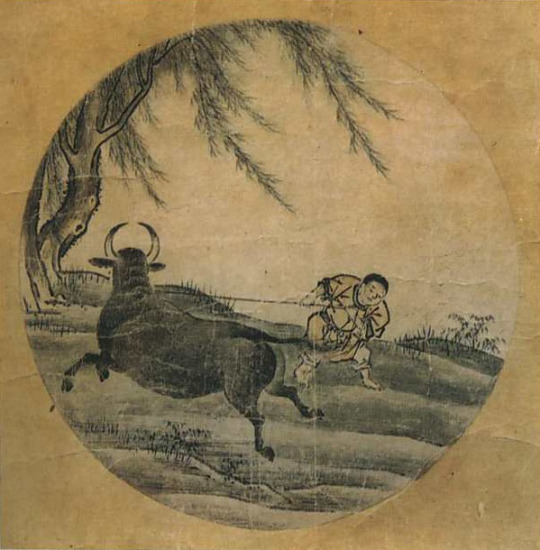
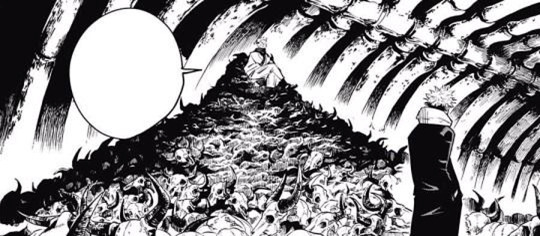
("twisted love ") his curse and power "kitchen"- (10 bulls Buddhism- you can read in wiki ) - he literally kills (eats) the “bull” "human" his own self constantly, so there are a lot of their skulls inside him - his own , and he sits on the throne of them, his essences, believing that he has “surpassed” himself - the human nature
"Sukuna is surrounded by the remnants of his failed attempts to transcend his ego, symbolized by the "skulls" of his former selves."
maybe this is part of the “vow” of constantly fighting (eating) within yourself
Self hatred
Like the seals on his shoulders - circles
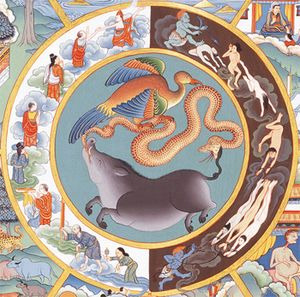
Sukuna is the strongest because he suffers the most, hates himself and experiences an internal conflict that generates cursed energy.
Anger (rage, aggression, a sense of vengeance, disgust) is represented in the image of a snake. The snake typically slithers away when approached by a human or attacks them. Similarly, a person seeks to eliminate an irritating object from their field of perception, either by avoiding it or destroying it. This is similar to his behavior and avoidance of Yuji - the epitome of absolution - kindness, because he unconsciously experiences disgust – the truth.
The Rooster is a symbol of passion, as it is both the owner of a harem and capable of finding a tiny grain in the grass and dust – exactly what it needs; just as passion keenly selects its object of desire from the multitude presented. This can be compared to how Sukuna chooses his opponents.
Ignorance (neglect, stupidity, laziness, foolishness) is represented in the image of a pig. The pig eats everything indiscriminately, unable to discern between good and bad, fortunate and unfortunate due to its lack of understanding. Incidentally, the pig is the only animal unable to lift its head to the sun. However, Sukuna usually regards others disdainfully from top to bottom, like a large pig, experiencing "foolishness" because he has confined himself within the pigsty of his own convictions.

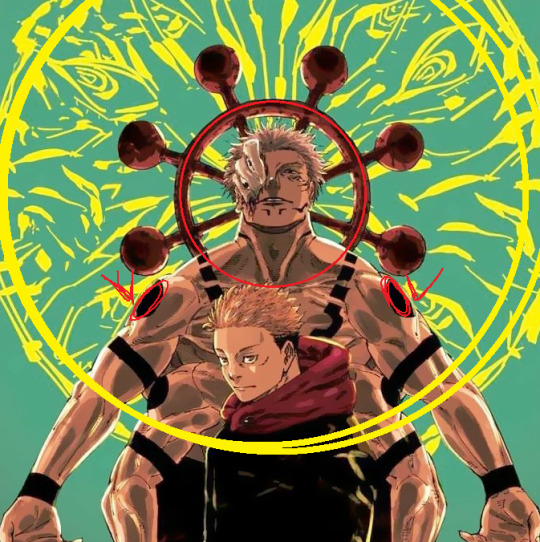
Perhaps not intentionally, but symbolically, Yuji's head is at the level of his heart.
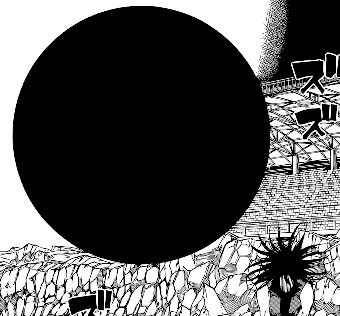
In other words, the cursed energy spawns a concentration circle of hatred , trapping individuals in an endless cycle of conflict,a cycle of samsara- in which people remain fighting with another person with their emotions. - mostly hatred
This could be seen as a vow or a struggle to overcome one's own limitations , by constantly confronting and consuming aspects of the self.

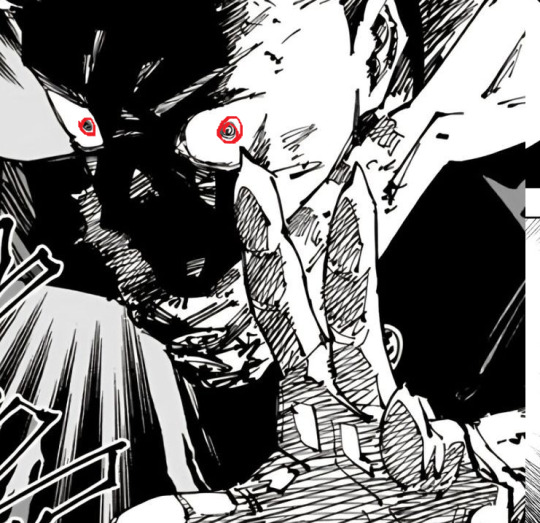

"You weren't merely defeated by external forces, but by your own internal strife—your perpetual disdain for your human side."
your downfall stemmed from your own internal contradictions, which morphed into a binding oath (all his seals on his body literally seal a person in him). Your disdain for humanity, extending even to yourself, became both your strength and your curse, corroding your soul from within (gestures toward the mask).
(the mask) Much like Tengen, embodies a constructive "emptiness" that exists harmoniously with the world, at peace with people. However, Sukuna's "emptiness" is purely literal, representing a detachment from humanity, a void of sorts.
You've lost all sense of purpose, consumed by self-loathing to the point of utter emptiness.
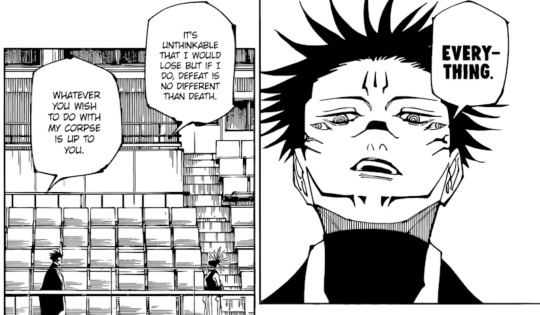
he is his strength - and if he loses, he "strength "will die, which means to him that he is nothing(because "I" = strength ),( which everything) he can feel , towards "him " is hate, emptiness ,insignificance - nothing - cant take "love".
nothing is nothing - so it his - corpse
paradoxically there cannot be “love”, because only the “strong” are loved.
It's as if he can't even comprehend the idea of being loved or valued without his strength.
Without it, he feel like a mere shell of himself, devoid of purpose or meaning. - corpse
his "manhtra "
His strength defines him, and should he lose it, his very essence will wither away, leaving him feeling like nothing.-(which everything to him.) Because in his eyes, strength equals identity, and without it, he is left hollow, consumed by feelings of worthlessness and self-loathing.
To him, strength is everything, and without it, he feels empty and insignificant. He's trapped in a mindset where only the strong are valued or capable of receiving love, leaving him unable to grasp the concept of being cherished for anything other than his strength. Without this defining trait, he fears becoming a mere shadow of himself, devoid of purpose and meaning—a walking corpse. His mantra revolves around the idea that his strength is synonymous with his identity; losing it would strip away everything that makes him who he is, leaving behind only a hollow shell consumed by feelings of worthlessness and self-doubt.
This fear of worthlessness drives him to cling desperately to his strength, as he sees it as the only thing protecting him from a profound sense of misery and insignificance. It's not so much a fear of death that motivates him, but a fear of experiencing the emptiness and smallness he associates with weakness.
So when he talks to Yuji he projects
You are my special
"Get lost in me" - "Become me."
I wanna feel your heatwave - Break down.
I love you, baby - I hate you
because you don't yield to me, to my strength
A world spinning in ambiguity - on the other hand, if Yuji does not give in, then Sukuna loses his “power” - himself and his hatred,"And will make him feel (1 )'loven'."- (This means that Yuji literally robs him of his purpose - his strength - himself - his self-loathing.)
(1 )This suggests that Sukuna's identity is closely tied to his ability to dominate others, especially Yuji. If Yuji resists, Sukuna not only loses his power and sense of self but also his profound self-hatred, leaving him vulnerable to experiencing an unfamiliar emotion—love. In essence, losing control and self-hatred allows Sukuna to explore a more vulnerable side of himself.
You are my special
"Even if the meaning is not correct, the fact is that they mirror to each other."
He wants to prove that his own existence and self-hatred are justified.
Sukuna conducts " a series of trials " before Yuji, aiming to prove to him that his purity of soul is not the basis of his strength. He expresses the belief that the source of strength lies in the ability to be cruel and hateful rather than kind. In his worldview, strength arises from self-loathing and denial, while love and compassion are seen as manifestations of weakness.
Sukuna seeks to affirm his beliefs through these trials and sufferings. He desires to break Yuji, to bring him down to his own level of hatred, in order to confirm his own existence and self-hatred. For him, pure strength becomes a symbol of his self-loathing - his own "self." He seeks to reinforce this hatred through Yuji, who, in his opinion, is excessively pure and capable of loving others unconditionally, which, in his view, renders his strength useless and undermines his own existence.
Overall, Sukuna's character is driven by a complex interplay of fear and a desperate need for validation through the lens of strength and self-loathing.
SURVIVAL
"You're so weak yet you cling to life?"
CHILD "I"- lack of strength" - weak and misery- unwanted , rejected, unloved, insignificant, unimportant, nothing, profound sense of emptiness and smallness.- DEATH
"You should spend your lives stifling (EATING)your misery. "
(Sukuna -Child - Yuji)

It seems to me that here it is being said that a brother or another close person can replace a parent in terms of providing love and understanding "self", as well as becoming a reliable support for the individual.
Perhaps previously he believed that self-love was meaningless (although he assumed this applied to others as well), but after encountering Yugi's soul, he realized that love, akin to dedication to an ideal, gains significance as it can transcend death and become something eternal, which is the true meaning. This enlightenment proved more significant than Sukuna's physical prowess, piercing his self-perception for the first time and shaking him to the core.
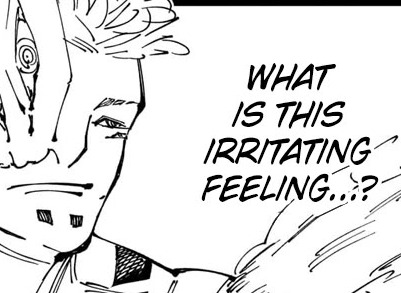
As the only thing he had been doing was killing time to die.
From the expression on his face in these two frames, there is a similarity: when it comes to love, he appears irritated, but this time he felt it - the love - and experienced pain, for the first time in a long while.

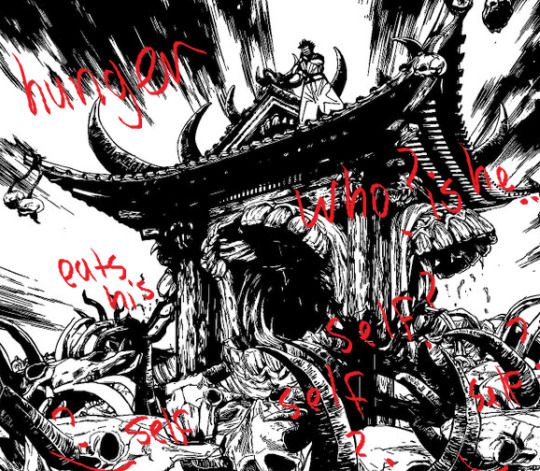
Sukuna, as the most powerful being, has moved away from the notion that his strength guarantees victory. Now it's more of a shadow of an ideal—meaning himself as well, because Sukuna possesses only power—a symbol of relentless personal resilience that he finds in Yuji. He has realized that without this strength, he is devoid of purpose, and in his pursuit of it, he has lost everything, including himself and his inner content. While in Yuji, lacking this power, his eyes shine like a beacon of humanity the love he needed—an ideal that transcends himself, through the idea of protecting others, akin to Prometheus his kindness. This irritates Sukuna and casts doubt on his own existence.
The deal is that Sukuna, regarded as the "strongest " was bored and annoyed with Yuji because his strength was based on something Sukuna could never understand or accept—the true essence of love.
Love, as a force and a tool, is immeasurable except through the sacrifice of those who gave their lives for the ideals of higher humanity—those whom Sukuna could not understand and whom he killed in his pursuit of "strength" and acts of violence deemed "supreme" beyond human nature.
Only after meeting Yuji did Sukuna gain insight, and his transformation can be characterized as a (2 )manifestation of love. Because he begins to "understand" other aspects of human existence, such as compassion, selflessness, and the ideals of higher humanity. In this context, his insight and change are perceived as manifestations of (2 ) love—understanding and accepting these human qualities that he previously could not comprehend or acknowledge.
The (1 ) first follows from the (2) second, but Sukuna hasn't understood it yet, he has only feel it.
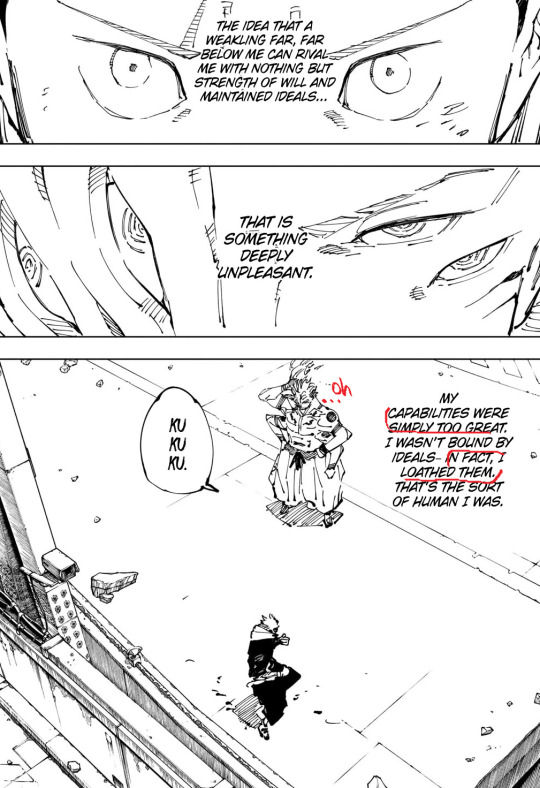
Sukuna has long lost the battle against his own hatred, mired in feelings of anger and jealousy. These emotions only fill him with disappointment and rage, fueling his desire to seek ways to cause pain and damage solely to destroy Yuji and undermine his faith
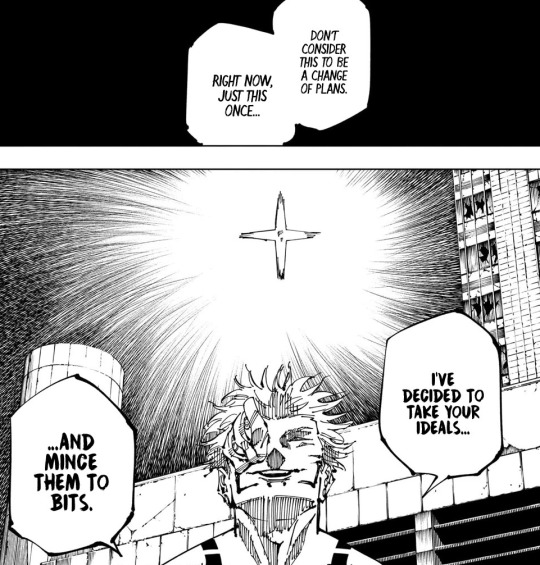
The acknowledgment that his kindness - love is genuine and unconditional seems incomprehensible to him, as if he's afraid to admit that such a thing is possible - because he was not loved and had no one. and that means he didn’t need anyone to satisfy him


Short version
He remembers his yearning for love during childhood, seeing it as a symbol of vulnerability and lack of significance. Regarding dependence on someone "stronger" as a weakness, he holds the belief that seeking affection and connections is characteristic only of the weak.
As a child, Sukuna often felt vulnerable due to his weaknesses, which made him feel chained to his flaws. This prevented him from truly loving himself and others, and he believed that only the strong deserved love, attention, and respect. Sukuna realized that true strength lies not in seeking love, but in giving it to others. However, he saw this gesture as a weakness and chose to demonstrate his strength through hatred instead of love. In battles, he "gave" his "strength " - "love "to others as a form of victory, judging the weak (including himself) as deserving of destruction. Sukuna rejected the concept of love as a dependency for the weak and meaningless for the strong. He avoids using names because he sees his past (weak) self in others, particularly Yuji, and despises himself for it.
In the past, Sukuna often felt vulnerable because of his weaknesses. It created the impression that he was shackled by a chain linking him to his flaws. This hindered him from truly "loving" himself and others, experiencing compassion ..? huh. He believed that only the strong deserved love, attention, and respect, and without strength, he was nothing.

That's why Sukuna realized that true strength lies not in the pursuit of love, but in being able to "give" it to others. He concluded that such a gesture is something only the weak need. Therefore, he decided to resort to another way of demonstrating his "strength"—using it as a tool of hatred instead of love.

Here, he seems to be contemplating a reflection that doesn't actually exist, only its silhouette - in the present, or, to be more precise, he sees himself in Yuji - in the past.
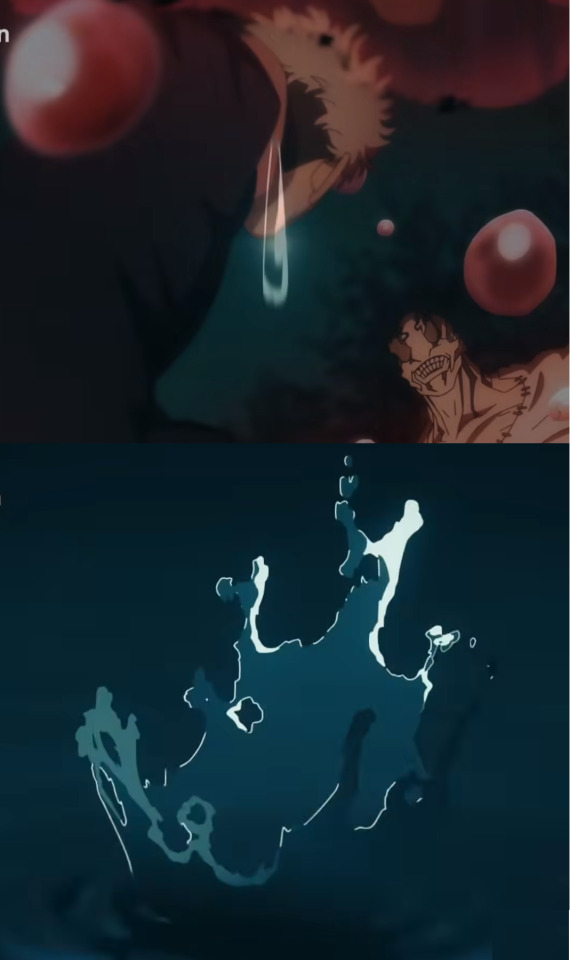
I wonder that this drop falls in Sukuna's domain, isn't it?

Sukuna began "giving" his "strength" to others in battles, seeing it as his version of "love"—an act of victory, where he acts as the judge of the battle, where the weak (Sukuna)are destroyed. And he decided to abandon the concept of love, considering it a dependency meant only for the weak and meaningless (now he's above "love" ,he is not a child, a parallel with Yuji and his treatment of him is disdainful-he recognizes himself in him)for the strong.
So he refrains from using his name because he sees himself (specifically, his past self as a child) in him - and despises himself.
Sukuna regarded strength as the sole indicator of success, and it became his driving force, but, like fuel, it only fed his inner hunger, the desire for self-destruction, rather than self?-love. He replaced strength with a sense of his former insignificance. Even being the most powerful, he couldn't stop and didn't find satisfaction, destroying himself, killing his "self" in the process, which ultimately led him to emptiness. - But the fact is that this emptiness is not of a Buddhist nature, not grounding, but self-eating
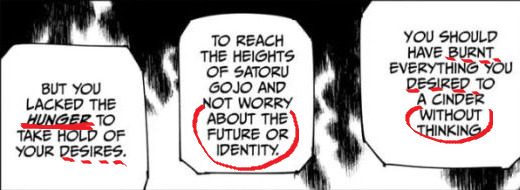

In the depths of Yuji, there is something that I am sure will turn out to be his hidden power : the ability to transform internal negative emotions into a manifestation of faith in goodness. He will not just suppress these emotions but actively engage in a struggle with them. Yuji uses hatred as a sort of weapon against hatred itself—like fighting fire with fire. He will begin to see "more than he" the idea of hatred as an inner enemy present in each of us, reflected in his own personality, in Sukuna, and in the personalities of those around him.
And thus, Yuji will strive to separate (Cut like Sukuna) his opponents from their "evil" and direct his energy only towards this "evil," which is the opposite of a Sukuna's self-hatred power ,Yuji can be viewed as a mirror reflecting Sukuna's twisted power of love.
Speculation below
The absence of parental love can create a profound void in childhood, leading to a deficiency in emotional support which, in turn, contributes to negative self-perception and attitudes toward oneself and the world. This deficiency often manifests as low self-esteem, self-hatred, and behavioral issues such as aggression or depression. Jacques Lacan's concept of the "mirror" provides insight into how parental relationships sculpt a child's self-perception and psychological development.
It is intriguing to observe how Yuji and Sukuna mirror each other's behaviors.
Identification and emulation: Individuals who lack parental figures may seek to emulate others who resonate with them or serve as role models. This behavior often stems from a desire to comprehend how to appear, feel, and act based on observed traits in others.
Search for emotional connection: People who lacked parental figures or did not receive adequate emotional connection during childhood often strive for intimate relationships with individuals who can fulfill this emotional void.
It's worth noting that characters may not fit perfectly into any one personality type due to their complexity and fantastical nature.
Yuji's identity is deeply intertwined with television. Gege's narrative underscores that he "grew up on television," suggesting that this medium became a surrogate for parental figures and filled the emotional void in his life. His enthusiasm for parodies and karaoke, venues where he could interact with others, reflects his ambiguous sense of individuality, likely influenced by television as his primary source of inspiration and behavioral model. Additionally, his emotionally reserved grandfather deprived him of necessary support during childhood. - if unfounded then Yuji INFJ -INFJs are known as chameleons, adapting to different situations. This clarifies why Yuuji excels in collaborative combat and absorbs lessons from others—he's like a sponge.
Sukuna's depiction as a petulant child reflects emotional immaturity and egocentrism commonly associated with unresolved childhood traumas or deficiencies in parental nurturing. His reactions and demeanor echo characteristics typical of children: egocentrism, emotional volatility, rebellion, and disobedience. His unpredictable behavior mirrors the emotional turbulence of a child grappling with feelings of abandonment or neglect, particularly evident in situations beyond his control or comprehension. - if unfounded then Sukuna INTJ
INFJ : "I may not always understand the intricacies of your emotions on an intellectual level, but I can feel them deeply.It might not intrigue you cold mind , but it brings warmth to your heart." Breathing life into your being."

INTJ: "Your natural stands as an enigma within my ordered world. Yet, I find myself drawn to this anomaly, stirring within me something beyond rational comprehension. This connection, however unconventional, holds a fascination that I cannot ignore."
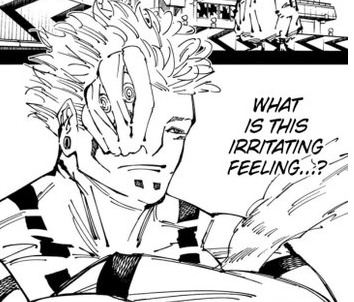
One feels the other thinks - but they are one -connection between Yuji and Sukuna, suggesting that despite their apparent differences, there is a symbiotic relationship between them. This mean that they influence each other in profound ways, with Yuji's emotional sensitivity complementing Sukuna's strategic thinking, or vice versa. It indicates that their identities are intertwined on a fundamental level, even though they may manifest differently in terms of behavior and personality.
Nevertheless, Sukuna experiences a transformative moment when he acknowledges and embraces the profound love emanating from Yuji. This revelation serves as a form of "enlightenment" or "rebirth," illuminating a path within the darkness of his existence. This is the first time Sukuna encounters unconditional love. For him, it signifies liberation from hidden motives, such as the desire to use others in his childish power games ("me versus you," "who's superior," etc.), simply to kill time. Now, he avoids manipulations he once considered normal but which Yuji interprets as a craving for attention. Yuji doesn't value "power," leading Sukuna to the paradoxical conclusion that he's unloved - the only thing he ever desired. He realizes his past actions were merely theatrics, where he played the leading role, but now, meeting Yuji, everything changes. Yuji doesn't engage in this game, refusing to succumb to the spectacle of death for emptiness' sake. This moment underscores parental resilience, selfless guidance, and dedication to the greater good.
This realization is especially poignant following Sukuna's unsuccessful attempts to break Yuji. Yuji's unwavering loyalty and resilience, directed not towards himself, exemplify a depth of love Sukuna has never encountered. Sukuna's inability to avert his gaze from Yuji, despite the accompanying anguish, underscores his inner turmoil. This revelation challenges his preconceived notions, exposes internal conflicts, and highlights emotional vacancy, reflecting the difficulty he faces in embracing newfound emotions and comprehending the true essence of love and loyalty.
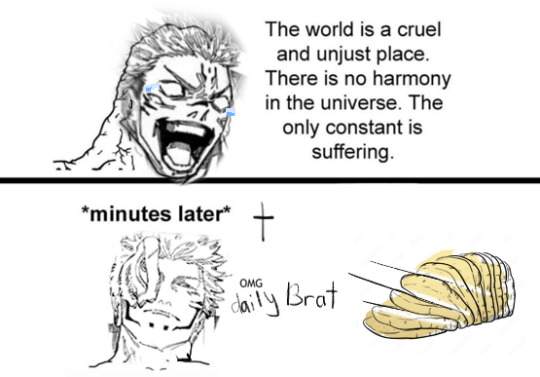
#jjk meta#ryomen sukuna#jujutsu kaisen#jujutsu kaisen theory#jujutsu kaisen analysis#jjk#jujutsu kaisne spoiler#yuji itadori#jjk manga#manga#anime#jjk spoiler#jjk analysis#jjk 255#jjk 256#sukuita
130 notes
·
View notes
Text
A little spontaneous analysis on Sukuna and his view on love and rejection that I blurted out while reading about Heian Era marriage this morning 🤓
That Sukuna panel came to mind with him saying, he’s “a cursed, unwanted little wretch”. (I was told “hated” was another way to translate it, but it’s the same in the end).
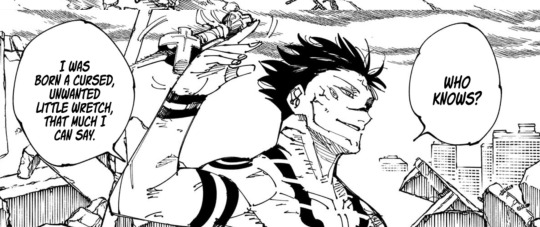

Disclaimer: These are just my thoughts using this specific translation. However Sukuna is a complex character and nothing is black and white and I’m probably heavily cherry picking here or reading way too much into this more than I should or would be necessary. 😆 WELL
Somehow it struck to me that one of the FEW things we know about Sukuna, is that he never married or bore any children. This is even more interesting, considering the fact that in the JJK verse, we do have a few absent wifes/lovers to name, that we know little to nothing about. Be it Megumi‘s mother, Kaori or a nonexistent wife of Sukuna. People often claim that Sukuna is a virgin, cause he didn’t marry or had kids. This is a whole other discussion, but this claim kept lingering in my head and made me think about marriage in the first place. Marriage and children often being a wholesome concept of love in our modern understanding, I first thought the marriage thing to be in connection to his claim to love being useless, that he not even once had interest in love. I think there‘s more to that.
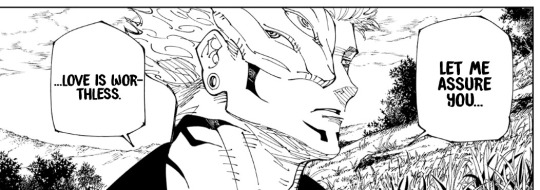
(although I do think that someone who claims that love is worthless kinda sounds heartbroken, but yeah anyway)
But then I thought „wait we’re speaking ancient times, did love play any role in marriage anyway?“
We still don‘t know the social status in which Sukuna was born in, but in regards to heian era, marriage was first and foremost a thing to secure and show social status. Marriages out of love weren‘t common, even seen as unrealistic.


Marriages were mostly arranged, often when they were still teenagers even. And this is what caught my attention. Sukuna says he was born a cursed unwanted little wretch and I first assumed this claim purely focuses on his parents and his early childhood.

But given the social norms in heian era, what if it also meant that he was literally unable to marry later on, that he wasn’t just unwanted by his by his parents, but by a possible spouse as well? Him saying he was “cursed and unwanted” indicates that it was a state he was put in, not a state he sought out to be. You could even argue, that him saying he was “unwanted” or “hated” even required him not wanting to be treated that way. Which child would want that? Which makes it even more interesting that he says, that he never thought about needing someone else to fulfill him. In connection to what I said before, it could almost sound hateful. As well as this moment here, which always occurred to me as if he said it from own experience.

Because when you grow up in a surrounding that hates & repels you, it makes sense that you grow indifferent to society, but it doesn’t necessarily mean it was always that way. Him being unwanted makes so much sense in connection with him saying, that he focuses solely on himself and that he has complete disregard to others. Which makes sense, when it’s a result of not having anybody who wants or loves you. It leaves you with yourself and yourself only.
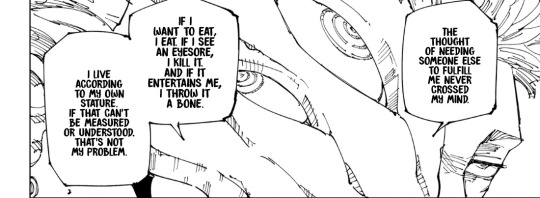
I know a lot of you really wanna fight the thought of Sukuna having a hard childhood but who cares honestly? I don‘t think it would make him less of a strong character. Every human is the result of their surroundings and as stated, Sukuna is human too. Based on that, you could even argue that the only kind of love he knows and sees as the real love, was an aggressive one. This would explain why he sees the slaughter of those who fought Kashimo as love.
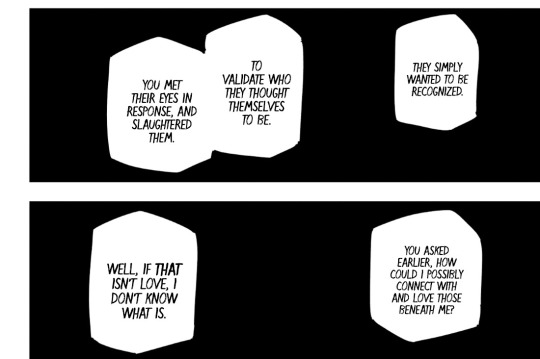
Ok back to marriage! When I read about marriage, there was another thing that caught my attention and that was poetry! We know Sukuna is a little nerd, who is eager to learn and it’s indicated that he even enjoyed poetry. (His immediate reaction to Yorozu‘s Haiku being that it lacks the seasonal word.) Back then, when someone was about to apply for marriage, what did they do? Yeah right, they wrote letters to someone.
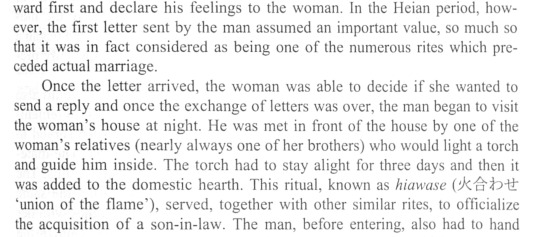
As I stated above, you could assume that there was a time, where Sukuna was not utterly hateful and indifferent to social contacts (I know that’s a reach, but that’s up for interpretation as long as we don’t know his backstory.)
If we assume, that Sukuna was born looking the way he looks, then it wouldn’t surprise me if there was a lot of rejection involved in the way the proposal was practised as described above. I don‘t wanna paint Sukuna as the poor rejected here, but idk maybe he was.
We all eagerly await Sukuna‘s backstory and I‘m so excited to learn about him. This suddenly turned into an analysis of Sukuna and his view on love and whatnot, but please remember, I’m not saying that any of this might have actually happened.
It’s just some connections my brain made while reading about marriage and thinking about some of the stuff that Sukuna said. I just had to write it down.
Here‘s the source: click
182 notes
·
View notes
Text
Sukuna’s potential weakness(?), ideals and irritation with Yuji

I find Sukuna’s monologue special, as it is rare that we ever get to see what he’s thinking.
I think Gege is beginning to reveal how Jujutsu High will win against Sukuna. If not with solely strength, then certainly by extension of their ideals.
What I believe we got is one of Sukuna’s weaknesses being that he’s lacking in great ideals.
As Sukuna has said a number of times, he lives by default of his nature and nothing more. He eats when he wants to, plays whenever he wants, so on and so forth. But that’s it. Nothing more.

^This quote was initially said during Kashimo’s final moments.

Kashimo was the first to question Sukuna on his ideals with “Doesn’t that get old?”
And I think it actually does, whether or not Sukuna wants to admit that. That in of itself could be his fatal flaw. To simply chase after the thrill of battle with the occasional amusing opponent (i.e. Gojo Satoru, Higuruma) would naturally become boring in the long run especially if the opportunity is far and few between.
He quite literally had Kenjaku divide his soul into several cursed objects (20 fingers), jumping 1,000 years into the future to experience a different era of sorcerers. He’s a freak fr 😭
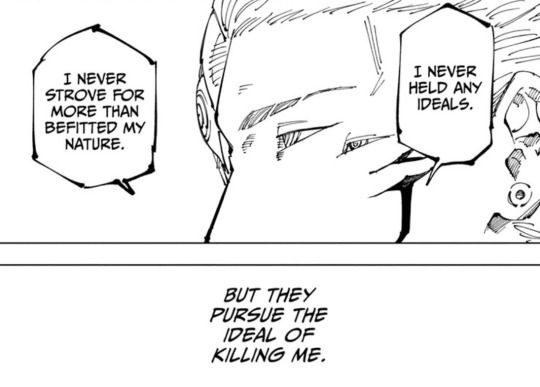
Anyways, Sukuna’s monologue also reveals something else. It shows that Sukuna’s ideals pale in comparison to Yuji’s who will stop at nothing to rid the world of the calamity known as Sukuna.
In shonen fashion, Yuji’s purpose is selfless and for the greater good.
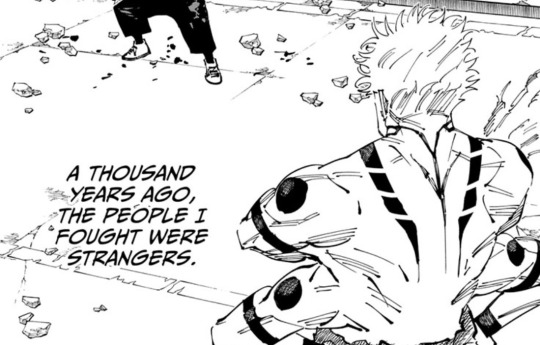

^Here, Sukuna is describing a clear distinction of what separates Heian era sorcerers from the ones of today. The sorcerers he was up against had ideals that were boastful and built on pride. They wanted to see how their individual strength faired against the King of Curses.
This was alluded to in Chapter 3 regarding sorcerers from the Golden Age.
“…Sorcerers had sharpened their skills against him…”
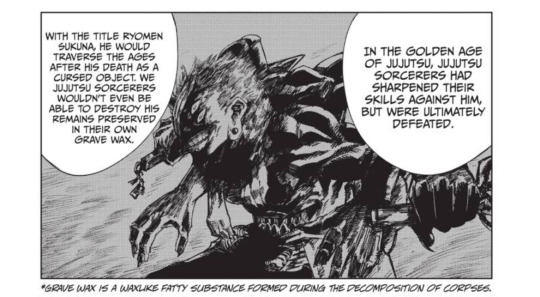
In other words, they fought for themselves. Similar to Sukuna, it was for self satisfaction and nothing more. They were weaker to him in more ways than strength and it showed in their convictions.

Yuji is weaker than Sukuna, but where where his strength matches the King of Curses is through sheer will and ideals. Unlike those he mowed down in the Heian era, Yuji devotion is unwavering.
It goes without saying and Nobara said it best:
If it’s just pain, Yuji will never stop.
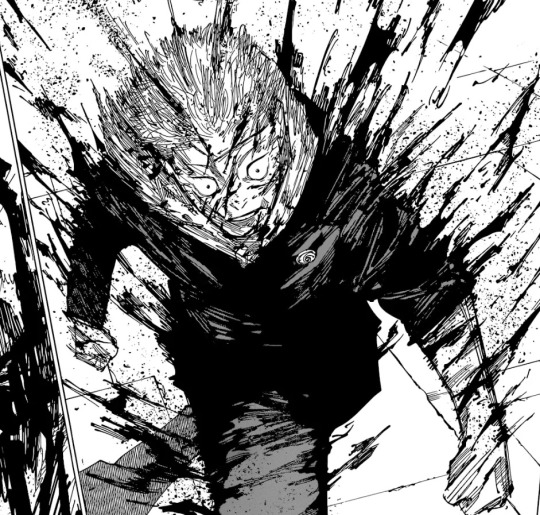
That is what irritates the living out hell out of Sukuna. And having once inhabiting the same body, he’s fully aware of this fact.
#jjk spoilers#jjk#jjk 248#yuji itadori#sukuna#jujutus kaisen#manga#manga spoilers#gege akutami#jjk 249#manga theory#gojo satoru#higuruma hiromi#jujutsu sorcerer#jujutsu kaisen#sorcery fight#sukuna vs yuji#jjk manga#jujutsu itadori#it’s for i#itadori yuji
157 notes
·
View notes
Text
Yeah… this is the face of disgust
It’s over ya’ll
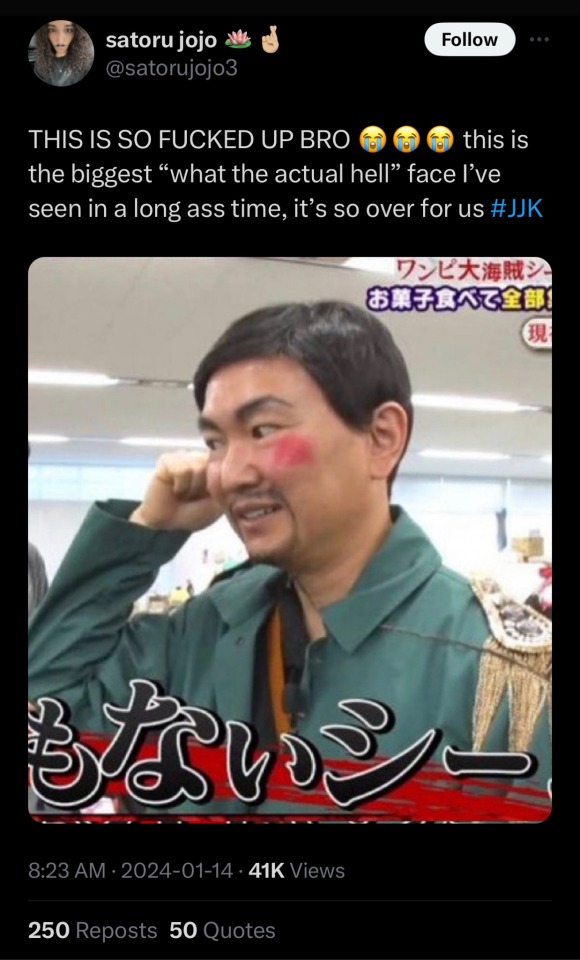
[For context this is a TV host’s reaction to JJK’s editor showing him an incoming “shocking” chapter.]
I TOLD YA’LL WE CAN’T TRUST THAT MAN G*GE
#it’s nanami coming back and being possessed by sukuna btw#jjk#jujutsu kaisen#jujutsu kaisen spoilers#jjk manga#jujutsu kaisen fandom#gojo#gojo satoru#jjk theory#jjk thoughts#jjk yuji#yuji itadori#ryomen sukuna#sukuna#yuta okkotsu#kenjaku#jujutsu kaisen ino#culling games#culling game arc
169 notes
·
View notes